#Scholarly Computer Science Research
Explore tagged Tumblr posts
Text

The Indian Journal of Computer Science and Technology (INDJCST) is a peer-reviewed academic journal that delivers cutting-edge research and advancements in computer science to scientists, engineers, and technology professionals.
It highlights the latest findings across four key domains: computing (including theory, scientific, cloud, and high-performance computing), systems (such as database, real-time, and operating systems), intelligence (covering robotics, bioinformatics, and artificial intelligence), and applications (encompassing security, networking, software engineering, and more).
#Peer-Reviewed Computer Science Journal#Scholarly Computer Science Research#Latest Developments in Computer Science#Computing Theory and Applications#Scientific Computing Journal#Cloud Computing Research#High-Performance Computing Studies#Database Systems Research
0 notes
Text
Twinkump Linkdump

I'm on a 20+ city book tour for my new novel PICKS AND SHOVELS. Catch me in SAN DIEGO at MYSTERIOUS GALAXY next MONDAY (Mar 24), and in CHICAGO with PETER SAGAL on Apr 2. More tour dates here.

I have an excellent excuse for this week's linkdump: I'm in Germany, but I'm supposed to be in LA, and I'm not, because London Heathrow shut down due to a power-station fire, which meant I spent all day yesterday running around like a headless chicken, trying to get home in time for my gig in San Diego on Monday (don't worry, I sorted it):
https://www.mystgalaxy.com/32425Doctorow
Therefore, this is 30th linkdump, in which I collect the assorted links that didn't make it into this week's newsletters. Here are the other 29:
https://pluralistic.net/tag/linkdump/
I always like to start and end these 'dumps with some good news, which isn't easy in these absolutely terrifying times. But there is some good news: Wil Wheaton has announced his new podcast, a successor of sorts to the LeVar Burton Reads podcast. It's called "It's Storytime" and it features Wil reading his favorite stories handpicked from science fiction magazines, including On Spec, the magazine that bought my very first published story (I was 16, it ran in their special youth issue, it wasn't very good, but boy did it mean a lot to me):
https://wilwheaton.net/podcast/
Here's some more good news: a court has found (again!) that works created by AI are not eligible for copyright. This is the very best possible outcome for people worried about creators' rights in the age of AI, because if our bosses can't copyright the botshit that comes out of the "AI" systems trained on our work, then they will pay us:
https://www.yahoo.com/news/us-appeals-court-rejects-copyrights-171203999.html
Our bosses hate paying us, but they hate the idea of not being able to stop people from copying their entertainment products so! much! more! It's that simple:
https://pluralistic.net/2023/08/20/everything-made-by-an-ai-is-in-the-public-domain/
This outcome is so much better than the idea that AI training isn't fair use – an idea that threatens the existence of search engines, archiving, computational linguistics, and other clearly beneficial activities. Worse than that, though: if we create a new copyright that allows creators to prevent others from scraping and analyzing their works, our bosses will immediately alter their non-negotiable boilerplate contracts to demand that we assign them this right. That will allow them to warehouse huge troves of copyrighted material that they will sell to AI companies who will train models designed to put us on the breadline (see above, re: our bosses hate paying us):
https://pluralistic.net/2024/03/13/hey-look-over-there/#lets-you-and-he-fight
The rights of archivists grow more urgent by the day, as the Trump regime lays waste to billions of dollars worth of government materials that were produced at public expense, deleting decades of scientific, scholarly, historical and technical materials. This is the kind of thing you might expect the National Archive or the Library of Congress to take care of, but they're being chucked into the meat-grinder as well.
To make things even worse, Trump and Musk have laid waste to the Institute of Museum and Library Services, a tiny, vital agency that provides funding to libraries, archives and museums across the country. Evan Robb writes about all the ways the IMLS supports the public in his state of Washington:
Technology support. Last-mile broadband connection, network support, hardware, etc. Assistance with the confusing e-rate program for reduced Internet pricing for libraries.
Coordinated group purchase of e-books, e-audiobooks, scholarly research databases, etc.
Library services for the blind and print-disabled.
Libraries in state prisons, juvenile detention centers, and psychiatric institutions.
Digitization of, and access to, historical resources (e.g., newspapers, government records, documents, photos, film, audio, etc.).
Literacy programming and support for youth services at libraries.
The entire IMLS budget over the next 10 years rounds to zero when compared to the US federal budget – and yet, by gutting it, DOGE is amputating significant parts of the country's systems that promote literacy; critical thinking; and universal access to networks, media and ideas. Put it that way, and it's not hard to see why they hate it so.
Trying to figure out what Trump is up to is (deliberately) confusing, because Trump and Musk are pursuing a chaotic agenda that is designed to keep their foes off-balance:
https://www.wired.com/story/elon-musk-donald-trump-chaos/
But as Hamilton Nolan writes, there's a way to cut through the chaos and make sense of it all. The problem is that there are a handful of billionaires who have so much money that when they choose chaos, we all have to live with it:
The significant thing about the way that Elon Musk is presently dismantling our government is not the existence of his own political delusions, or his own self-interested quest to privatize public functions, or his own misreading of economics; it is the fact that he is able to do it. And he is able to do it because he has several hundred billion dollars. If he did not have several hundred billion dollars he would just be another idiot with bad opinions. Because he has several hundred billion dollars his bad opinions are now our collective lived experience.
https://www.hamiltonnolan.com/p/the-underlying-problem
We actually have a body of law designed to prevent this from happening. It's called "antitrust" and 40 years ago, Jimmy Carter decided to follow the advice of some of history's dumbest economists who said that fighting monopolies made the economy "inefficient." Every president since, up to – but not including – Biden, did even more to encourage monopolization and the immense riches it creates for a tiny number of greedy bastards.
But Biden changed that. Thanks to the "Unity Taskforce" that divided up the presidential appointments between the Democrats' corporate wing and the Warren/Sanders wing, Biden appointed some of the most committed, effective trustbusters we'd seen for generations:
https://pluralistic.net/2022/10/18/administrative-competence/#i-know-stuff
After Trump's election, there was some room for hope that Trump's FTC would continue to pursue at least some of the anti-monopoly work of the Biden years. After all, there's a sizable faction within the MAGA movement that hates (some) monopolies:
https://pluralistic.net/2025/01/24/enforcement-priorities/#enemies-lists
But last week, Trump claimed to have illegally fired the two Democratic commissioners on the FTC: Alvaro Bedoya and Rebecca Slaughter. I stan both of these commissioners, hard. When they were at the height of their powers in the Biden years, I had the incredible, disorienting experience of getting out of bed, checking the headlines, and feeling very good about what the government had just done.
Trump isn't legally allowed to fire Bedoya and Slaughter. Perhaps he's just picking this fight as part of his chaos agenda (see above). But there are some other pretty good theories about what this is setting up. In his BIG newsletter, Matt Stoller proposes that Trump is using this case as a wedge, trying to set a precedent that would let him fire Federal Reserve Chair Jerome Powell:
https://www.thebignewsletter.com/p/why-trump-tried-to-fire-federal-trade
But perhaps there's more to it. Stoller just had Commissioner Bedoya on Organized Money, the podcast he co-hosts with David Dayen, and Bedoya pointed out that if Trump can fire Democratic commissioners, he can also fire Republican commissioners. That means that if he cuts a shady deal with, say, Jeff Bezos, he can order the FTC to drop its case against Amazon and fire the Republicans on the commission if they don't frog when he jumps:
https://www.organizedmoney.fm/p/trumps-showdown-at-the-ftc-with-commissioner
(By the way, Organized Money is a fantastic podcast, notwithstanding the fact that they put me on the show last week:)
https://audio.buzzsprout.com/6f5ly01qcx6ijokbvoamr794ht81
The future that our plutocrat overlords are grasping for is indeed a terrible one. You can see its shape in the fantasies of "liberatarian exit" – the seasteads, free states, and other assorted attempts to build anarcho-capitalist lawless lands where you can sell yourself into slavery, or just sell your kidneys. The best nonfiction book on libertarian exit is Raymond Criab's 2022 "Adventure Capitalism," a brilliant, darkly hilarious and chilling history of every time a group of people have tried to found a nation based on elevating selfishness to a virtue:
https://pluralistic.net/2022/06/14/this-way-to-the-egress/#terra-nullius
If Craib's book is the best nonfiction volume on the subject of libertarian exit, then Naomi Kritzer's super 2023 novel Liberty's Daughter is the best novel about life in a libertopia – a young adult novel about a girl growing up in the hell that would be life with a Heinlein-type dad:
https://pluralistic.net/2023/11/21/podkaynes-dad-was-a-dick/#age-of-consent
But now this canon has a third volume, a piece of design fiction from Atelier Van Lieshout called "Slave City," which specs out an arcology populated with 200,000 inhabitants whose "very rational, efficient and profitable" arrangements produce €7b/year in profit:
https://www.archdaily.com/30114/slave-city-atelier-van-lieshout
This economic miracle is created by the residents' "voluntary" opt-in to a day consisting of 7h in an office, 7h toiling in the fields, 7h of sleep, and 3h for "leisure" (e.g. hanging out at "The Mall," a 24/7, 26-storey " boundless consumer paradise"). Slaves who wish to better themselves can attend either Female Slave University or Male Slave University (no gender controversy in Slave City!), which run 24/7, with 7 hours of study, 7 hours of upkeep and maintenance on the facility, 7h of sleep, and, of course, 3h of "leisure."
The field of design fiction is a weird and fertile one. In his traditional closing keynote for this year's SXSW Interactive festival, Bruce Sterling opens with a little potted history of the field since it was coined by Julian Bleeker:
https://bruces.medium.com/how-to-rebuild-an-imaginary-future-2025-0b14e511e7b6
Then Bruce moves on to his own latest design fiction project, an automated poetry machine called the Versificatore first described by Primo Levi in an odd piece of science fiction written for a newspaper. The Versificatore was then adapted to the screen in 1971, for an episode of an Italian sf TV show based on Levi's fiction:
https://www.youtube.com/watch?v=tva-D_8b8-E
And now Sterling has built a Versificatore. The keynote is a sterlingian delight – as all of his SXSW closers are. It's a hymn to the value of "imaginary futures" and an instruction manual for recovering them. It could not be more timely.
Sterling's imaginary futures would be a good upbeat note to end this 'dump with, but I've got a real future that's just as inspiring to close us out with: the EU has found Apple guilty of monopolizing the interfaces to its devices and have ordered the company to open them up for interoperability, so that other manufacturers – European manufacturers! – can make fully interoperable gadgets that are first-class citizens of Apple's "ecosystem":
https://www.reuters.com/technology/apple-ordered-by-eu-antitrust-regulators-open-up-rivals-2025-03-19/
It's a good reminder that as America crumbles, there are still places left in the world with competent governments that want to help the people they represent thrive and prosper. As the Prophet Gibson tells us, "the future is here, it's just not evenly distributed." Let's hope that the EU is living in America's future, and not the other way around.

If you'd like an essay-formatted version of this post to read or share, here's a link to it on pluralistic.net, my surveillance-free, ad-free, tracker-free blog:
https://pluralistic.net/2025/03/22/omnium-gatherum/#storytime

Image: TDelCoro https://www.flickr.com/photos/tomasdelcoro/48116604516/
CC BY-SA 2.0 https://creativecommons.org/licenses/by-sa/2.0/
#pluralistic#bruce sterling#design fiction#sxsw#Atelier Van Lieshout#libertopia#libertarian exit#wil wheaton#sf#science fiction#podcasts#linkdump#linkdumps#apple#eu#antitrust#interop#interoperabilty#ai#copyright#law#glam#Institute of Museum and Library Services#libraries#museums#ftc#matt stoller#david dayen#alvaro bedoya#rebecca slaughter
86 notes
·
View notes
Text
A scholarly bibliography of Design Fiction, AI and the news, 2025
ACKNOWLEDGMENTS
The work was funded by the Helsingin Sanomat Foundation and the Kone Foundation. We thank all the ideation workshop participants.
REFERENCES
[1] Naseem Ahmadpour, Sonja Pedell, Angeline Mayasari, and Jeanie Beh. 2019. Co-creating and Assessing Future Wellbeing Technology Using Design
Fiction. She Ji 5, 3 (2019), 209 230. DOI:https://doi.org/10.1016/j.sheji.2019.08.003
[2] ArtefactGroup. The Tarot Cards of Tech. Retrieved August 10, 2024 from https://tarotcardsoftech.artefactgroup.com
[3] Reuben Binns. 2018. Algorithmic Accountability and Public Reason. Philos. Technol. 31, 4 (December 2018), 543 556.
DOI:https://doi.org/10.1007/S13347-017-0263-5/METRICS
[4] Julian Bleecker. 2009. Design Fiction: A Short Essay on Design, Science, Fact and Fiction. Retrieved January 9, 2020 from
http://drbfw5wfjlxon.cloudfront.net/writing/DesignFiction_WebEdition.pdf
[5] [6] Julian Bleecker, Nick Foster, Fabien Girardin, and Nicolas Nova. 2022. The Manual of Design Fiction.
Mark Blythe. 2014. Research through design fiction: Narrative in real and imaginary abstracts. Conf. Hum. Factors Comput. Syst. - Proc. (2014), 703
712. DOI:https://doi.org/10.1145/2556288.2557098
[7] Mark Blythe and Enrique Encinas. 2016. The co-ordinates of design fiction: Extrapolation, irony, ambiguity and magic. Proc. Int. ACM Siggr. Conf.
Support. Gr. Work 13-16-Nove, (2016), 345 354. DOI:https://doi.org/10.1145/2957276.2957299
[8] J. Broekens, M. Heerink, and H. Rosendal. 2009. Assistive social robots in elderly care: a review. Gerontechnology 8, 2 (2009).
DOI:https://doi.org/10.4017/gt.2009.08.02.002.00
[9] Kevin Matthe Caramancion. 2023. News Verifiers Showdown: A Comparative Performance Evaluation of ChatGPT 3.5, ChatGPT 4.0, Bing AI, and
Bard in News Fact-Checking. Proc. - 2023 IEEE Futur. Networks World Forum Futur. Networks Imagining Netw. Futur. FNWF 2023 (2023).
DOI:https://doi.org/10.1109/FNWF58287.2023.10520446
[10] Mia Carbone, Stuart Soroka, and Johanna Dunaway. 2024. The Psychophysiology of News Avoidance: Does Negative Affect Drive Both Attention and Inattention to News? Journal. Stud. (September 2024). DOI:https://doi.org/10.1080/1461670X.2024.2310672
[11] John M. Carroll. 1997. Human computer interaction: psychology as a science of design. Int. J. Hum. Comput. Stud. 46, 4 (April 1997), 501 522.
DOI:https://doi.org/10.1006/IJHC.1996.0101
[12] Mark Chignell, Lu Wang, Atefeh Zare, and Jamy Li. 2023. The Evolution of HCI and Human Factors: Integrating Human and Artificial Intelligence.
ACM Trans. Comput. Interact. 30, 2 (March 2023). DOI:https://doi.org/10.1145/3557891/ASSET/0C373876-F5A8-40E8-A46E-
273567CE2001/ASSETS/GRAPHIC/TOCHI-2021-0178-F03.JPG
[13] Justin Clark, Robert Faris, Urs Gasser, Adam Holland, Hilary Ross, and Casey Tilton. 2019. Content and Conduct: How English Wikipedia Moderates
Harmful Speech. Retrieved September 11, 2024 from https://papers.ssrn.com/abstract=3489176
[14] Marios Constantinides, John Dowell, David Johnson, and Sylvain Malacria. 2015. Exploring mobile news reading interactions for news app
personalisation. MobileHCI 2015 - Proc. 17th Int. Conf. Human-Computer Interact. with Mob. Devices Serv. (August 2015), 457 462.
DOI:https://doi.org/10.1145/2785830.2785860/SUPPL_FILE/P457-CONSTANTINIDES-SUPPL.ZIP
[15] Henry Kudzanai Dambanemuya and Nicholas Diakopoulos. 2021. Auditing the Information Quality of News-Related Queries on the Alexa Voice
Assistant. Proc. ACM Human-Computer Interact. 5, CSCW1 (April 2021). DOI:https://doi.org/10.1145/3449157
[16] [17] [18] Nicholas Diakopoulos. 2019. Automating the news: how algorithms are rewriting the media. (2019), 326.
Carl DiSalvo. 2012. Adversarial design as inquiry and practice. MIT Press.
Abraham Doris-Down, Husayn Versee, and Eric Gilbert. 2013. Political blend: An application designed to bring people together based on political
differences. ACM Int. Conf. Proceeding Ser. (2013), 120 130. DOI:https://doi.org/10.1145/2482991.2483002
[19] Konstantin Nicholas Dörr. 2016. Mapping the field of Algorithmic Journalism. Digit. Journal. 4, 6 (2016), 700 722.
DOI:https://doi.org/10.1080/21670811.2015.1096748
[20] Konstantin Nicholas Dörr and Katharina Hollnbuchner. 2017. Ethical Challenges of Algorithmic Journalism. Digit. Journal. 5, 4 (April 2017), 404
419. DOI:https://doi.org/10.1080/21670811.2016.1167612
[21] Tomislav Duricic, Dominik Kowald, Emanuel Lacic, and Elisabeth Lex. 2023. Beyond-accuracy: a review on diversity, serendipity, and fairness in
recommender systems based on graph neural networks. Front. Big Data 6, (December 2023), 1251072.
DOI:https://doi.org/10.3389/FDATA.2023.1251072/BIBTEX
[22] Seth Flaxman, Sharad Goel, Justin M Rao, David Blei, Ceren Budak, Susan Dumais, Andrew Gelman, Dan Goldstein, Matt Salganik, Tim Wu, and
Georgios Zervas. 2016. Filter Bubbles, Echo Chambers, and Online News Consumption. Public Opin. Q. 80, S1 (January 2016), 298 320.
DOI:https://doi.org/10.1093/POQ/NFW006
[23] [24] Richard Fletcher and R. Nielsen. 2024. What does the public in six countries think of generative AI in news?
Terry Flew, Christina Spurgeon, Anna Daniel, and Adam Swift. 2012. The Promise of Computational Journalism. Journal. Pract. 6, 2 (2012), 157 171.
DOI:https://doi.org/10.1080/17512786.2011.616655
[25] Julian De Freitas, Stuti Agarwal, Bernd Schmitt, and Nick Haslam. 2023. Psychological factors underlying attitudes toward AI tools. Nat. Hum. Behav.
242023 711 7, 11 (November 2023), 1845 1854. DOI:https://doi.org/10.1038/s41562-023-01734-2
[26] Fiona Fui-Hoon Nah, Ruilin Zheng, Jingyuan Cai, Keng Siau, and Langtao Chen. 2023. Generative AI and ChatGPT: Applications, challenges, and
AI-human collaboration. J. Inf. Technol. Case Appl. Res. 25, 3 (July 2023), 277 304. DOI:https://doi.org/10.1080/15228053.2023.2233814
[27] Fuse. 2024. Fuse - Personalized News. Retrieved August 10, 2024 from https://pageone.livesemantics.com/
[28] hary Kenton, Mikel
Rodriguez, Seliem El-Sayed, Sasha Brown, Canfer Akbulut, Andrew Trask, Edward Hughes, and Et Al. 2024. The Ethics of Advanced AI Assistants.
(April 2024), 2024 2028. Retrieved September 9, 2024 from https://arxiv.org/abs/2404.16244v2
[29] Mingqi Gao, Xinyu Hu, Jie Ruan, Xiao Pu, and Xiaojun Wan. 2024. LLM-based NLG Evaluation: Current Status and Challenges. (February 2024).
Retrieved September 8, 2024 from https://arxiv.org/abs/2402.01383v2
[30] William W Gaver, Peter Gall Krogh, and Andy Boucher. 2022. Emergence as a Feature of Practice-based Design Research. In Designing Interactive
, 517 526.
[31] Sabine Geers. 2020. News Consumption across Media Platforms and Content: A Typology of Young News Users. Public Opin. Q. 84, S1 (August 2020),
332 354. DOI:https://doi.org/10.1093/POQ/NFAA010
[32] Nicole Gillespie, STeven Lockey, Caitlin Curtis, Javad Pool, and Ali Akbari. 2023. Trust in Artificial Intelligence: Meta-Analytic Findings. Univ.
Queensl. KPMG Aust. 10, (2023). DOI:https://doi.org/10.14264/00d3c94
[33] [34] GroundNews. 2024. Ground News. Retrieved August 3, 2024 from https://ground.news/about
Michael M. Grynbaum and Ryan Mac. 2023. The Times Sues OpenAI and Microsoft Over A.I. Use of Copyrighted Work. The New York Times.
Retrieved January 15, 2024 from https://www.nytimes.com/2023/12/27/business/media/new-york-times-open-ai-microsoft-lawsuit
[35] Derek Hales. 2013. Design fictions an introduction and provisional taxonomy. Digit. Creat. 24, 1 (March 2013), 1 10.
DOI:https://doi.org/10.1080/14626268.2013.769453
[36] Vikas Hassija, Vinay Chamola, Atmesh Mahapatra, Abhinandan Singal, Divyansh Goel, Kaizhu Huang, Simone Scardapane, Indro Spinelli, Mufti Mahmud, and Amir Hussain. 2024. Interpreting Black-Box Models: A Review on Explainable Artificial Intelligence. Cognit. Comput. 16, 1 (January
2024), 45 74. DOI:https://doi.org/10.1007/S12559-023-10179-8/FIGURES/14
[37] Michael Townsen Hicks, James Humphries, and Joe Slater. 2024. ChatGPT is bullshit. Ethics Inf. Technol. 26, 2 (June 2024), 1 10.
DOI:https://doi.org/10.1007/S10676-024-09775-5/METRICS
[38] Lennart Hofeditz, Milad Mirbabaie, Jasmin Holstein, and Stefan Stieglitz. 2021. Do You Trust an AI-Journalist? A Credibility Analysis of News
Content with AI-Authorship. ECIS (2021), 6 14. Retrieved from https://aisel.aisnet.org/ecis2021_rp/50
[39] Naja Holten Holten Møller, Trine Rask Nielsen, and Christopher Le Dantec. 2021. Work of the Unemployed. DIS 2021 - Proc. 2021 ACM Des. Interact.
Syst. Conf. Nowhere Everywhere (June 2021), 438 448. DOI:https://doi.org/10.1145/3461778.3462003/ASSETS/HTML/IMAGES/IMAGE3.JPG
[40] Avery E. Holton and Hsiang Iris Chyi. 2012. News and the Overloaded Consumer: Factors Influencing Information Overload Among News
Consumers. https://home.liebertpub.com/cyber 15, 11 (November 2012), 619 624. DOI:https://doi.org/10.1089/CYBER.2011.0610
[41] Chenyan Jia, Martin J. Riedl, and Samuel Woolley. 2024. Promises and Perils of Automated Journalism: Algorithms, Experimentat
Journal. Stud. 25, 1 (January 2024), 38 57. DOI:https://doi.org/10.1080/1461670X.2023.2289881
[42] Sangyeon Kim, Insil Huh, and Sangwon Lee. 2022. No Movie to Watch: A Design Strategy for Enhancing Content Diversity through Social
Recommendation in the Subscription-Video-On-Demand Service. Appl. Sci. 2023, Vol. 13, Page 279 13, 1 (December 2022), 279.
DOI:https://doi.org/10.3390/APP13010279
[43] Joel Kiskola, Thomas Olsson, Heli Väätäjä, Aleksi H. Syrjämäki, Anna Rantasila, Poika Isokoski, Mirja Ilves, and Veikko Surakka. 2021. Applying critical voice in design of user interfaces for supporting self-reflection and emotion regulation in online news commenting. In of the 2021 CHI Conference on Human Factors in Computing Systems, Association for Computing Machinery.
DOI:https://doi.org/10.1145/3411764.3445783
[44] n with Black Mirror.
SIGCSE 2022 - Proc. 53rd ACM Tech. Symp. Comput. Sci. Educ. 1, (February 2022), 836 842. DOI:https://doi.org/10.1145/3478431.3499308
[45] Tomoko Komatsu, Marisela Gutierrez Lopez, Stephann Makri, Colin Porlezza, Glenda Cooper, Andrew MacFarlane, and Sondess Missaoui. 2020. AI
should embody our values: Investigating journalistic values to inform AI technology design. ACM Int. Conf. Proceeding Ser. (October 2020).
DOI:https://doi.org/10.1145/3419249.3420105
[46] Peter Gall Krogh, Thomas Markussen, and Anne Louise Bang. 2015. Ways of drifting Five methods of experimentation in research through design.
Smart Innov. Syst. Technol. 34, (2015), 39 50. DOI:https://doi.org/10.1007/978-81-322-2232-3_4/TABLES/1
[47] Shaun Lawson, Ben Kirman, Conor Linehan, Tom Feltwell, and Lisa Hopkins. 2015. Problematising Upstream Technology through Speculative
Design: The Case of Quantified Cats and Dogs. DOI:https://doi.org/10.1145/2702123.2702260
[48] Hao Ping Lee, Yu Ju Yang, Thomas Serban von Davier, Jodi Forlizzi, and Sauvik Das. 2024. Deepfakes, Phrenology, Surveillance, and More! A
Taxonomy of AI Privacy Risks. Conf. Hum. Factors Comput. Syst. - Proc. (May 2024).
DOI:https://doi.org/10.1145/3613904.3642116/SUPPL_FILE/PN8548-SUPPLEMENTAL-MATERIAL-1.XLSX
[49] Sunok Lee, Minha Lee, and Sangsu Lee. 2023. What If Artificial Intelligence Become Completely Ambient in Our Daily Lives? Exploring Future
Human-AI Interaction through High Fidelity Illustrations. Int. J. Hum. Comput. Interact. 39, 7 (2023), 1371 1389.
DOI:https://doi.org/10.1080/10447318.2022.2080155
[50] rceptions of
Generative Artificial Intelligence. Conf. Hum. Factors Comput. Syst. - Proc. 18, 24 (May 2024).
25DOI:https://doi.org/10.1145/3613904.3642114/SUPPL_FILE/PN9381-SUPPLEMENTAL-MATERIAL-2.PDF
[51] Sixian Li, Alessandro M. Peluso, and Jinyun Duan. 2023. Why do we prefer humans to artificial intelligence in telemarketing? A mind perception
explanation. J. Retail. Consum. Serv. 70, (January 2023), 103139. DOI:https://doi.org/10.1016/J.JRETCONSER.2022.103139
[52] Joseph Lindley and Paul Coulton. 2015. Back to the future: 10 years of design fiction. ACM Int. Conf. Proceeding Ser. (2015), 210 211.
DOI:https://doi.org/10.1145/2783446.2783592
[53] Comput. Hum. Behav. Artif. Humans 2, 1
(January 2024), 100054. DOI:https://doi.org/10.1016/J.CHBAH.2024.100054
[54] [55] Listen2.AI. 2024. Listen2.AI. Retrieved August 7, 2024 from https://listen2.ai/
Andrés Lucero and Juha Arrasvuori. 2010. PLEX Cards: A source of inspiration when designing for playfulness. ACM Int. Conf. Proceeding Ser. (2010),
28 37. DOI:https://doi.org/10.1145/1823818.1823821
[56] Thomas Markussen and Eva Knutz. 2013. The poetics of design fiction. Proc. 6th Int. Conf. Des. Pleasurable Prod. Interfaces, DPPI 2013 (2013), 231
240. DOI:https://doi.org/10.1145/2513506.2513531
[57] Suvodeep Misra, Debayan Dhar, and Sukumar Nandi. 2023. Design Fiction: A Way to Foresee the Future of Human Computer Interaction Design
Challenges. Smart Innov. Syst. Technol. 343, (2023), 809 822. DOI:https://doi.org/10.1007/978-981-99-0293-4_65
[58] Rachel E. Moran and Sonia Jawaid Shaikh. 2022. Robots in the News and Newsrooms: Unpacking Meta-Journalistic Discourse on the Use of Artificial
Intelligence in Journalism. Digit. Journal. 10, 10 (November 2022), 1756 1774. DOI:https://doi.org/10.1080/21670811.2022.2085129
[59] Victoria Moreno-Gil, Xavier Ramon-Vegas, Ruth Rodríguez-Martínez, and Marcel Mauri-Ríos. 2023. Explanatory Journalism within European Fact
Checking Platforms: An Ally against Disinformation in the Post-COVID-19 Era. Soc. 2023, Vol. 13, Page 237 13, 11 (November 2023), 237.
DOI:https://doi.org/10.3390/SOC13110237
[60] Sean A. Munson, Stephanie Y. Lee, and Paul Resnick. 2013. Encouraging Reading of Diverse Political Viewpoints with a Browser Widget. Proc. Int.
AAAI Conf. Web Soc. Media 7, 1 (2013), 419 428. DOI:https://doi.org/10.1609/ICWSM.V7I1.14429
[61] Kevin P. Murphy. 2023. Probabilistic machine learning: Advanced topics. MIT Press.
[62] Nic Newman, Richard Fletcher, Craig T. Robertson, A. Ross Arguedas, and Rasmus Kleis Nielsen. 2024. Reuters Institute digital news report 2024.
[63] Safiya Umoja Noble. 2020. Algorithms of Oppression. Algorithms of Oppression (December 2020).
DOI:https://doi.org/10.18574/NYU/9781479833641.001.0001
[64] Donald Norman. 2024. Design for a Better World: Meaningful, Sustainable, Humanity Centered. MIT Press.
[65] treme Right
and Online Recommender Systems. Soc. Sci. Comput. Rev. 33, 4 (August 2015), 459 478.
DOI:https://doi.org/10.1177/0894439314555329/ASSET/IMAGES/LARGE/10.1177_0894439314555329-FIG5.JPEG
[66] Andreas L. Opdahl, Bjørnar Tessem, Duc Tien Dang-Nguyen, Enrico Motta, Vinay Setty, Eivind Throndsen, Are Tverberg, and Christoph Trattner.
2023. Trustworthy journalism through AI. Data Knowl. Eng. 146, April (2023), 102182. DOI:https://doi.org/10.1016/j.datak.2023.102182
[67] Sharon Oviatt. 2006. Human-centered design meets cognitive load theory: Designing interfaces that help people think. Proc. 14th Annu. ACM Int.
Conf. Multimedia, MM 2006 (2006), 871 880. DOI:https://doi.org/10.1145/1180639.1180831
[68] Ozlem Ozmen Garibay, Brent Winslow, Salvatore Andolina, Margherita Antona, Anja Bodenschatz, Constantinos Coursaris, Gregory Falco, Stephen
M. Fiore, Ivan Garibay, Keri Grieman, John C. Havens, Marina Jirotka, Hernisa Kacorri, Waldemar Karwowski, Joe Kider, Joseph Konstan, Sean
Koon, Monica Lopez-Gonzalez, Iliana Maifeld-Carucci, Sean McGregor, Gavriel Salvendy, Ben Shneiderman, Constantine Stephanidis, Christina
Strobel, Carolyn Ten Holter, and Wei Xu. 2023. Six Human-Centered Artificial Intelligence Grand Challenges. Int. J. Human Computer Interact. 39,
3 (2023), 391 437. DOI:https://doi.org/10.1080/10447318.2022.2153320
[69] Sumit Pahwa and Nusrat Khan. 2022. Factors Affecting Emotional Resilience in Adults. Manag. Labour Stud. 47, 2 (May 2022), 216 232.
DOI:https://doi.org/10.1177/0258042X211072935/ASSET/IMAGES/LARGE/10.1177_0258042X211072935-FIG1.JPEG
[70] Rock Yuren Pang, Sebastin Santy, René Just, and Katharina Reinecke. 2024. BLIP: Facilitating the Exploration of Undesirable Consequences of Digital
Technologies. Conf. Hum. Factors Comput. Syst. - Proc. (May 2024). DOI:https://doi.org/10.1145/3613904.3642054/SUPPL_FILE/PN1128-
SUPPLEMENTAL-MATERIAL-1.PDF
[71]
[72] Jonathan Perry. 2021. Trust in Public Institutions: Trends and Implications for Economic Security. Aff. United Nations Dep. Econ. Soc. (July 2021).
DOI:https://doi.org/10.18356/27081990-108
[73] James Pierce. 2021. In tension with progression: Grasping the frictional tendencies of speculative, critical, and other alternative designs. In Conference
on Human Factors in Computing Systems - Proceedings, Association for Computing Machinery. DOI:https://doi.org/10.1145/3411764.3445406
[74] Amanda Ramsälv, Mats Ekström, and Oscar Westlund. 2023. The epistemologies of data journalism. https://doi.org/10.1177/14614448221150439
(January 2023). DOI:https://doi.org/10.1177/14614448221150439
[75] Jeba Rezwana and Mary Lou Maher. 2023. User Perspectives on Ethical Challenges in Human-AI Co-Creativity: A Design Fiction Study. ACM Int.
Conf. Proceeding Ser. (2023), 62 74. DOI:https://doi.org/10.1145/3591196.3593364
[76] Francesco Ricci, Lior Rokach, and Bracha Shapira. 2022. Recommender Systems Handbook: Third Edition. Recomm. Syst. Handb. Third Ed. (January
2022), 1 1060. DOI:https://doi.org/10.1007/978-1-0716-2197-4
[77] Ronda Ringfort-Felner, Robin Neuhaus, Judith Dörrenbächer, Sabrina Großkopp, Dimitra Theofanou-fuelbier, and Marc Hassenzahl. 2023. Design
Fiction in a Corporate Setting a Case Study. In 14, 2023, 2093 2108.
DOI:https://doi.org/10.1145/3563657.3596126
26[78] Francisco Javier Rodrigo-Ginés, Jorge Carrillo-de-Albornoz, and Laura Plaza. 2024. A systematic review on media bias detection: What is media bias,
how it is expressed, and how to detect it. Expert Syst. Appl. 237, (March 2024), 121641. DOI:https://doi.org/10.1016/J.ESWA.2023.121641
[79] Lambèr Royakkers, Jelte Timmer, Linda Kool, and Rinie van Est. 2018. Societal and ethical issues of digitization. Ethics Inf. Technol. 20, 2 (June 2018),
127 142. DOI:https://doi.org/10.1007/S10676-018-9452-X/TABLES/1
[80] Alan M. Rubin, Elizabeth M. Perse, and Robert A. Powell. 1985. Loneliness, Parasocial Interaction, And Local Television News Viewing. Hum.
Commun. Res. 12, 2 (December 1985), 155 180. DOI:https://doi.org/10.1111/J.1468-2958.1985.TB00071.X
[81] Henrik Rydenfelt. 2022. Transforming media agency? Approaches to automation in Finnish legacy media. New Media Soc. 24, 12 (March 2022), 2598
2613. DOI:https://doi.org/10.1177/1461444821998705
[82] Henrik Rydenfelt, Lauri Haapanen, Jesse Haapoja, and Tuukka Lehtiniemi. 2024. Personalisation in Journalism: Ethical insights and blindspots in
Finnish legacy media. Journalism 25, 2 (November 2024), 313 333. DOI:https://doi.org/10.1177/14648849221138424
[83] Henrik Rydenfelt, Tuukka Lehtiniemi, Jesse Haapoja, and Lauri Haapanen. 2025. Autonomy and Algorithms: Tracing the Significance of Content
Personalization. Int. J. Commun. 19, 0 (January 2025), 20. Retrieved January 27, 2025 from https://ijoc.org/index.php/ijoc/article/view/23474
[84] Aljosha Karim Schapals, Colin Porlezza, and Rodrigo Zamith. 2020. Assistance or Resistance? Evaluating the Intersection of Automated Journalism
and Journalistic Role Conceptions. Media Commun. 8, 3 (July 2020), 16 26. DOI:https://doi.org/10.17645/MAC.V8I3.3054
[85] Jordan Richard Schoenherr, Roba Abbas, Katina Michael, Pablo Rivas, and Theresa Dirndorfer Anderson. 2023. Designing AI Using a Human-
Centered Approach: Explainability and Accuracy Toward Trustworthiness. IEEE Trans. Technol. Soc. 4, 1 (March 2023), 9 23.
DOI:https://doi.org/10.1109/TTS.2023.3257627
[86] Rifat Ara Shams, · Didar Zowghi, and · Muneera Bano. 2023. AI and the quest for diversity and inclusion: a systematic literature review. AI Ethics
2023 (November 2023), 1 28. DOI:https://doi.org/10.1007/S43681-023-00362-W
[87] Donghee Shin and Shuhua Zhou. 2024. A Value and Diversity-Aware News Recommendation Systems: Can Algorithmic Gatekeeping Nudge Readers
to View Diverse News? Journal. Mass Commun. Q. (June 2024).
DOI:https://doi.org/10.1177/10776990241246680/ASSET/IMAGES/LARGE/10.1177_10776990241246680-FIG3.JPEG
[88] Felix M. Simon. 2024. Artificial Intelligence in the News: How AI Retools, Rationalizes, and Reshapes Journalism and the Public Arena. Columbia
Journalism Review. Retrieved August 29, 2024 from https://www.cjr.org/tow_center_reports/artificial-intelligence-in-the-news.php
[89] Marie Louise Juul Søndergaard and Lone Koefoed Hansen. 2018. Intimate futures: Staying with the trouble of digital personal assistants through
design fiction. DIS 2018 - Proc. 2018 Des. Interact. Syst. Conf. (June 2018), 869 880.
DOI:https://doi.org/10.1145/3196709.3196766/SUPPL_FILE/DISFP430.MP4
[90] Catherine Sotirakou and Constantinos Mourlas. 2016. A Gamified News Application for Mobile Devices: An Approach that Turns Digital News
Readers into Players of a Social Network. Lect. Notes Comput. Sci. (including Subser. Lect. Notes Artif. Intell. Lect. Notes Bioinformatics) 9599, (2016),
480 493. DOI:https://doi.org/10.1007/978-3-319-40216-1_53
[91] [92] Bruce Sterling. 2005. Shaping Things. MIT Press.
Miriam Sturdee, Paul Coulton, Joseph G. Lindley, Mike Stead, Haider Ali Akmal, and Andy Hudson-Smith. 2016. Design fiction: How to build a
voight-kampff machine. Conf. Hum. Factors Comput. Syst. - Proc. 07-12-May-, (May 2016), 375 385. DOI:https://doi.org/10.1145/2851581.2892574
[93] Edson C. Tandoc and Soo Kwang Oh. 2017. Small Departures, Big Continuities? Journal. Stud. 18, 8 (August 2017), 997 1015.
DOI:https://doi.org/10.1080/1461670X.2015.1104260
[94] Neil Thurman, Seth C. Lewis, and Jessica Kunert. 2019. Algorithms, Automation, and News. Digit. Journal. 7, 8 (2019), 980 992.
DOI:https://doi.org/10.1080/21670811.2019.1685395
[95] Tamás Tóth, Manuel Goyanes, Márton Demeter, and Francisco Campos-Freire. 2022. Social Implications of Paywalls in a Polarized Society:
Stud. Big Data 97, (2022), 169 179. DOI:https://doi.org/10.1007/978-3-030-
88028-6_13
[96] Tommaso Turchi, Alessio Malizia, and Simone Borsci. 2024. Reflecting on Algorithmic Bias With Design Fiction: The MiniCoDe Workshops. IEEE
Intell. Syst. 39, 2 (March 2024), 40 50. DOI:https://doi.org/10.1109/MIS.2024.3352977
[97] tember 11, 2024
from https://books.google.com/books/about/Antisocial_Media.html?id=h05WDwAAQBAJ
[98] [99] Stephen J. Ward. 2019. Journalism ethics. In The handbook of journalism studies. Taylor & Francis, 307 323.
Stephen John Anthony Ward. 2015. The invention of journalism ethics: The path to objectivity and beyond. McGill- -MQUP.
[100] mated journalism.
Journalism 22, 1 (January 2021), 86 103. DOI:https://doi.org/10.1177/1464884918757072/ASSET/IMAGES/LARGE/10.1177_1464884918757072-
FIG1.JPEG
[101] Richmond Y. Wong, Deirdre K. Mulligan, Ellen Van Wyk, James Pierce, and John Chuang. 2017. Eliciting values reflections by engaging privacy
futures using design workbooks. Proc. ACM Human-Computer Interact. 1, CSCW (2017). DOI:https://doi.org/10.1145/3134746
[102] Richmond Y Wong and Vera Khovanskaya. 2018. Speculative Design in HCI: From Corporate Imaginations to Critical Orientations. Comput. Interact.
2, (2018). DOI:https://doi.org/10.1007/978-3-319-73374-6_10
[103] Nan Yu and Jun Kong. 2016. User experience with web browsing on small screens: Experimental investigations of mobile-page interface design and
homepage design for news websites. Inf. Sci. (Ny). 330, (February 2016), 427 443. DOI:https://doi.org/10.1016/J.INS.2015.06.004
[104] Mi Zhou, Vibhanshu Abhishek, Timothy Derdenger, Jaymo Kim, and Kannan Srinivasan. 2024. Bias in Generative AI. (March 2024). Retrieved
January 23, 2025 from https://arxiv.org/abs/2403.02726v1
27[105] John Zimmerman and Jodi Forlizzi. 2014. Research through design in HCI. In Ways of Knowing in HCI, Judith S. Olson and Wendy A. Kellogg (eds.).
Springer New York, New York, 167 189. DOI:https://doi.org/10.1007/978-1-4939-0378-8_8
3 notes
·
View notes
Text
Antikythera Mechanism
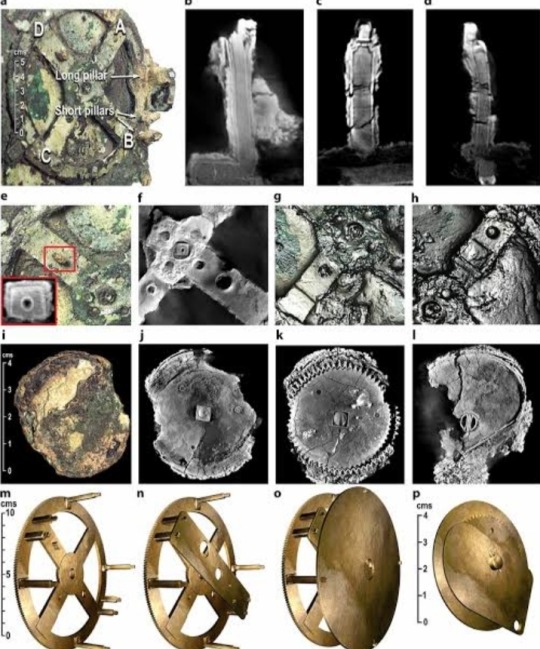
Researchers claim breakthrough in study of 2000 year-old Antikythera mechanism, an astronomical calculator found in sea.
From the moment it was discovered more than a century ago, scholars have puzzled over the Antikythera mechanism, a remarkable and baffling astronomical calculator that survives from the ancient world.
The hand-powered, 2000 year-old device displayed the motion of the universe, predicting the movement of the five known planets, the phases of the moon, and the solar and lunar eclipses.
But quite how it achieved such impressive feats has proved fiendishly hard to untangle.
Now researchers at UCL believe they have solved the mystery – at least in part – and have set about reconstructing the device, gearwheels and all, to test whether their proposal works.
If they can build a replica with modern machinery, they aim to do the same with techniques from antiquity.
“We believe that our reconstruction fits all the evidence that scientists have gleaned from the extant remains to date,” said Adam Wojcik, a materials scientist at UCL.
While other scholars have made reconstructions in the past, the fact that two-thirds of the mechanism are missing has made it hard to know for sure how it worked.
The mechanism, often described as the world’s first analogue computer, was found by sponge divers in 1901 amid a haul of treasures salvaged from a merchant ship that met with disaster off the Greek island of Antikythera.
The ship is believed to have foundered in a storm in 1st Century BC, as it passed between Crete and Peloponnese en route to Rome from Asia Minor.
The battered fragments of corroded brass were barely noticed at first, but decades of scholarly work have revealed the object to be a masterpiece of mechanical engineering.
Originally encased in a wooden box one foot tall, the mechanism was covered in inscriptions – a built-in user’s manual – and contained more than 30 bronze gearwheels connected to dials and pointers.
Turn the handle and the heavens, as known to the Greeks, swung into motion.
Michael Wright, a former curator of mechanical engineering at the Science Museum in London, pieced together much of how the mechanism operated and built a working replica, but researchers have never had a complete understanding of how the device functioned.
Their efforts have not been helped by the remnants surviving in 82 separate fragments, making the task of rebuilding it equivalent to solving a battered 3D puzzle that has most of its pieces missing.
Writing in the journal Scientific Reports, the UCL team describe how they drew on the work of Wright and others.
They used inscriptions on the mechanism and a mathematical method described by the ancient Greek philosopher Parmenides to work out new gear arrangements that would move the planets and other bodies in the correct way.
The solution allows nearly all of the mechanism’s gearwheels to fit within a space only 25mm deep.
According to the team, the mechanism may have displayed the movement of the sun, moon and the planets Mercury, Venus, Mars, Jupiter, and Saturn on concentric rings.
Because the device assumed that the sun and planets revolved around Earth, their paths were far more difficult to reproduce with gearwheels than if the sun was placed at the centre.
Another change the scientists propose is a double-ended pointer they call a “Dragon Hand” that indicates when eclipses are due to happen.
The researchers believe the work brings them closer to a true understanding of how the Antikythera device displayed the heavens, but it is not clear whether the design is correct or could have been built with ancient manufacturing techniques.
The concentric rings that make up the display would need to rotate on a set of nested, hollow axles, but without a lathe to shape the metal, it is unclear how the ancient Greeks would have manufactured such components.
#Antikythera mechanism#astronomical calculator#ancient world#ancient civilizations#Antikythera#world’s first analogue computer#corroded brass#mechanical engineering#inscriptions#gearwheels#Parmenides#ancient greece#ancient history
2 notes
·
View notes
Text




By: Aaron Sibarium
Published: Jan 30, 2024
It's not just Claudine Gay. Harvard University's chief diversity and inclusion officer, Sherri Ann Charleston, appears to have plagiarized extensively in her academic work, lifting large portions of text without quotation marks and even taking credit for a study done by another scholar—her own husband—according to a complaint filed with the university on Monday and a Washington Free Beacon analysis.
The complaint makes 40 allegations of plagiarism that span the entirety of Charleston's thin publication record. In her 2009 dissertation, submitted to the University of Michigan, Charleston quotes or paraphrases nearly a dozen scholars without proper attribution, the complaint alleges. And in her sole peer-reviewed journal article—coauthored with her husband, LaVar Charleston, in 2014—the couple recycle much of a 2012 study published by LaVar Charleston, the deputy vice chancellor for diversity and inclusion at the University of Wisconsin-Madison, framing the old material as new research.
Through that sleight of hand, Sherri Ann Charleston effectively took credit for her husband's work. The 2014 paper, which was also coauthored with Jerlando Jackson, now the dean of Michigan State University's College of Education, and appeared in the Journal of Negro Education, has the same methods, findings, and description of survey subjects as the 2012 study, which involved interviews with black computer science students and was first published by the Journal of Diversity in Higher Education.

The two papers even report identical interview responses from those students. The overlap suggests that the authors did not conduct new interviews for the 2014 study but instead relied on LaVar Charleston's interviews from 2012—a severe breach of research ethics, according to experts who reviewed the allegations.
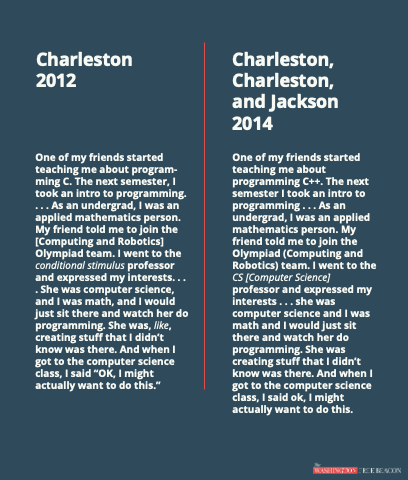
"The 2014 paper appears to be entirely counterfeit," said Peter Wood, the head of the National Association of Scholars and a former associate provost at Boston University, where he ran several academic integrity probes. "This is research fraud pure and simple."
Sherri Ann Charleston was the chief affirmative action officer at the University of Wisconsin-Madison before she joined Harvard in August 2020 as its first-ever chief diversity officer. In that capacity, Charleston served on the staff advisory committee that helped guide the university's presidential search process that resulted in the selection of former Harvard president Claudine Gay in December 2022, according to the Harvard Crimson.
A historian and attorney by training, Charleston has taught courses on gender studies at the University of Wisconsin, according to her Harvard bio, which describes her as "one of the nation's leading experts in diversity." The site says that her work involves "translating diversity and inclusion research into practice for students, staff, researchers, postdoctoral fellows and faculty of color."
Experts who reviewed the allegations against Charleston said that they ranged from minor plagiarism to possible data fraud and warrant an investigation. Some also argued that Charleston had committed a more serious scholarly sin than Gay, Harvard's former president, who resigned in January after she was accused of lifting long passages from other authors without proper attribution.
Papers that omit a few citations or quotation marks rarely receive more than a correction, experts said. But when scholars recycle large chunks of a previous study—especially its data or conclusions—without attribution, the duplicate paper is often retracted and can even violate copyright law.
That offense, known as duplicate publication, is typically a form of self-plagiarism in which authors republish old work in a bid to pad their résumés. Here, though, the duplicate paper added two new authors, Sherri Ann Charleston and Jerlando Jackson, who had no involvement in the original, letting them claim credit for the research and making them party to the con.
"Sherri Charleston appears to have used somebody else's research without proper attribution," said Steve McGuire, a former political theory professor at Villanova University, who reviewed both the 2012 and 2014 papers.
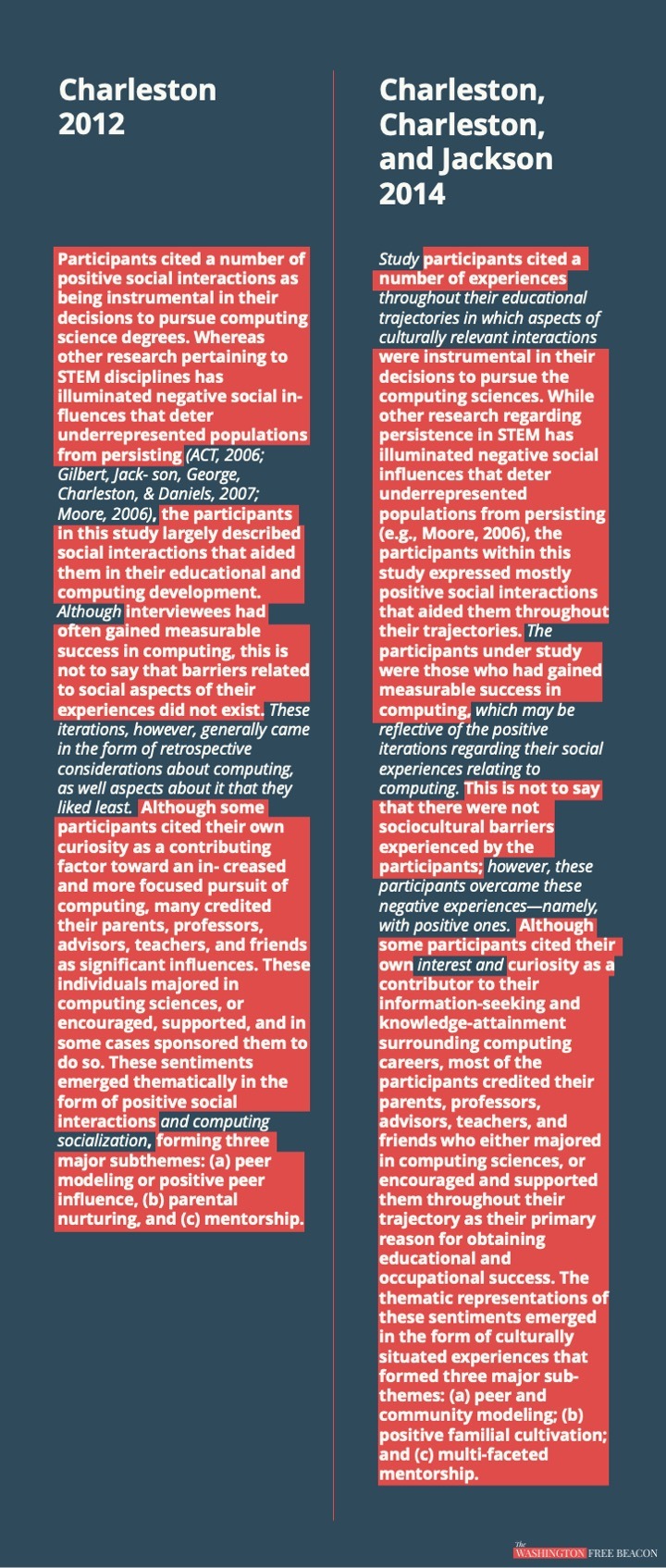
One-fifth of the 2014 paper, including two-thirds of its "findings" section, was published in the 2012 study, according to the complaint, and three interview responses are identical in both articles, suggesting they come from the same survey.
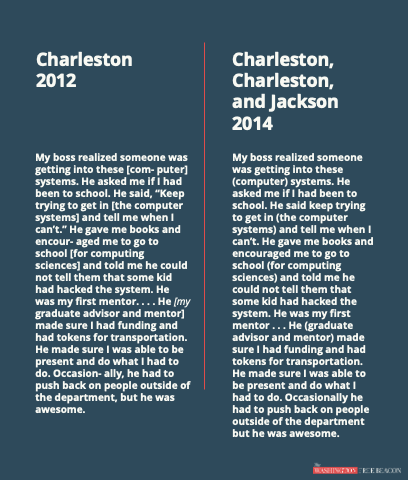
According to Lee Jussim, a social psychologist at Rutgers University, "it is essentially impossible for two different people in two different studies to produce the same quote." At best, he said, the authors got their wires crossed and mixed up interviews from two separate surveys, both of which just happened to involve 37 participants with the exact same demographic profile. At worst, the authors committed data fraud by framing old survey responses as new ones—a separate and more serious offense.
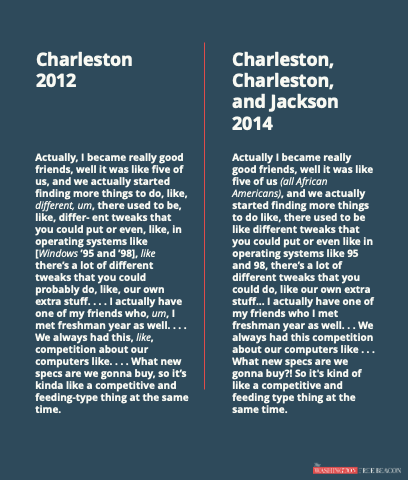
The Journal of Negro Education did not respond to a request for comment. Sherri Ann Charleston, LaVar Charleston, and Jerlando Jackson did not respond to requests for comment.

Monday's complaint, which was filed anonymously, comes as Harvard is facing questions about the integrity of its research affiliates and the ideology of its diversity bureaucrats, most of whom report to the sprawling office that Sherri Ann Charleston oversees.
The Dana-Farber Cancer Institute, one of Harvard Medical School's three teaching hospitals, announced in January that it would retract six papers and correct dozens more after some of its top executives were accused of data manipulation. That news came on the heels of a viral essay in which Carole Hooven, a Harvard biologist, described how she had been hounded out of a teaching role by her department's diversity committee after she said in an interview that there are only two sexes.
The school is also facing an ongoing congressional probe over its handling of anti-Semitism and its response to the plagiarism allegations against Gay, which Harvard initially sought to suppress with legal saber-rattling. Half of Gay's published work contained plagiarized material, ranging from single sentences to entire paragraphs, with some of the most severe lifts coming in her dissertation. Though Gay stepped down as president on January 2, she remains a tenured faculty member drawing a $900,000 annual salary.
Some of Charleston's offenses are similar to Gay's. In her 2009 dissertation, for example, Charleston borrows a sentence from Eric Arnesen's 1991 book Waterfront Workers of New Orleans: Race, Class, and Politics, 1863-1923, without quotation marks and without citing Arnesen's work in a footnote.
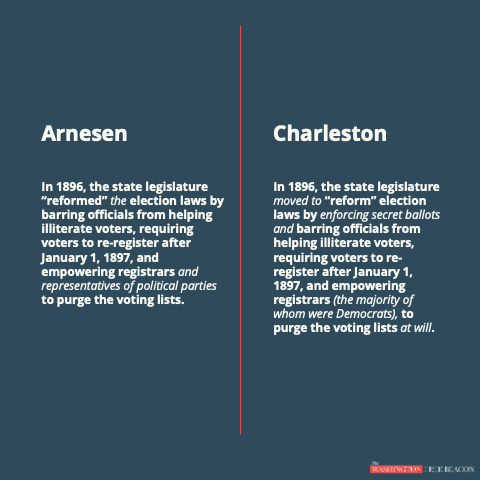
She also lifts full paragraphs from her thesis adviser, Rebecca Scott, while making minimal semantic tweaks.
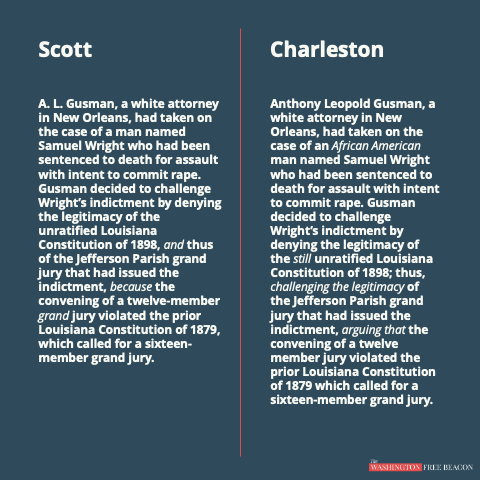
"There's simply not enough difference to consider them original words," said Jonathan Bailey, the founder of the website Plagiarism Today. "Though the sources in those examples are cited"—Charleston includes a footnote to Scott at the end of each passage—"the text either needed to be quoted or properly paraphrased."

Bailey added that the plagiarism of Scott alone merited an investigation—ideally, he said, "by a neutral party with no ties to either the school or the school's critics."
Harvard did not respond to a request for comment. Scott and Arnesen did not respond to requests for comment.
Charleston also lifted language from Louis Pérez, an historian at the University of North Carolina-Chapel Hill; Alejandro de la Fuente, an historian at Harvard; and Ada Ferrer, an historian at New York University, among other scholars.
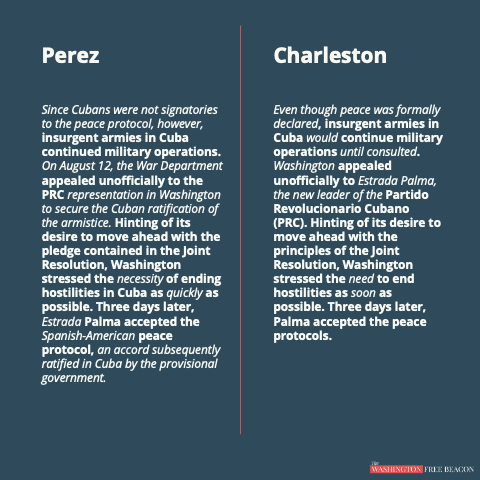
Charleston cites each source in a footnote but omits quotation marks around language copied verbatim. The omissions violate Harvard's Guide to Using Sources, a document produced for incoming students, which states that quotation marks are required when "you copy language word for word."
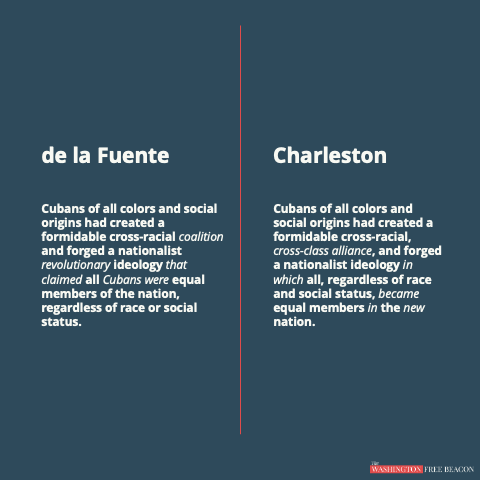
Pérez, de la Fuente, and Ferrer did not respond to requests for comment.

The range of examples presented in the complaint, which was also filed to the University of Michigan and the University of Wisconsin-Madison, highlights how plagiarism can shade into more severe forms of misconduct when it involves interviews or other data.
In fact, some experts said the term "plagiarism" didn't quite capture the dishonesty of duplicate publication, which is sometimes categorized as a separate offense and accounts for 14 percent of all paper retractions in the life sciences.
"You cannot just republish an old paper as if it is a new paper," Jussim, the Rutgers psychologist, said. "If you do, that is not exactly plagiarism; it's more like fraud."
Wood said the case was really a combination of the two offenses. "Because the second paper, on which Sherri Ann Charleston is one of the three co-authors, recycles so much of the text of the original paper by LaVar J. Charleston, this does have the earmarks of plagiarism, but the plagiarism is compounded by an even larger effort to deceive," he said. "The universities and journals need to investigate."
While scholars can reuse data across multiple papers, they must make clear when they are doing so and provide appropriate attribution to earlier studies, per guidelines from the Office of Research Integrity and the editorial policies of top academic journals, including Nature and Cell.
But the 2014 paper never indicates that it is reusing research from 2012. Instead, it claims to present new data that fill a "gap" in the literature and "corroborate" the 2012 study, among others, and on two occasions refers to survey subjects as "participants in this study."
Those participants appear to be the same people whom LaVar Charleston interviewed in 2012. Both surveys involved the same number of undergraduates, graduate students, Ph.D.s, and students at historically black colleges—all drawn from the same computer science conference—a similarity that experts said was a red flag.
"It is curious that the proportions are identical," said Debora Weber-Wulff, a German computer scientist who researches plagiarism and other forms of academic misconduct. "This would be grounds for the universities in question to request the data and investigate."
Jussim agreed. "This seems sufficiently improbable that, absent something saying they are re-reporting an already-published study, it would be fraud," he said.
LaVar Charleston did not respond to a request for comment about whether the two studies used the same interviews. The University of Michigan said it was "committed to fostering and upholding the highest ethical standards in research and scholarship," but declined to comment on the complaint. The University of Wisconsin-Madison told the Free Beacon it had "initiated an assessment in response to the allegations."
The main difference between the papers is a long section in the 2014 article about "culturally responsive pedagogy theory," which the authors say their findings support. Both articles are littered with the tropes of progressive scholarship, including a disclaimer about "positionality"—the authors assure readers that they reflected on their own "racial, gender, and socioeconomic status"—and a lament that computer science is a "White male-dominated field."
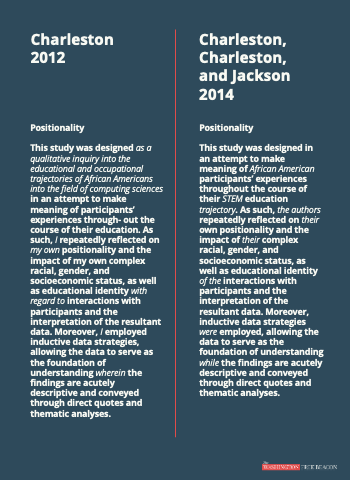
Both also criticize the idea that "computing sciences is for nerds, only for White people, [and] only for geniuses."
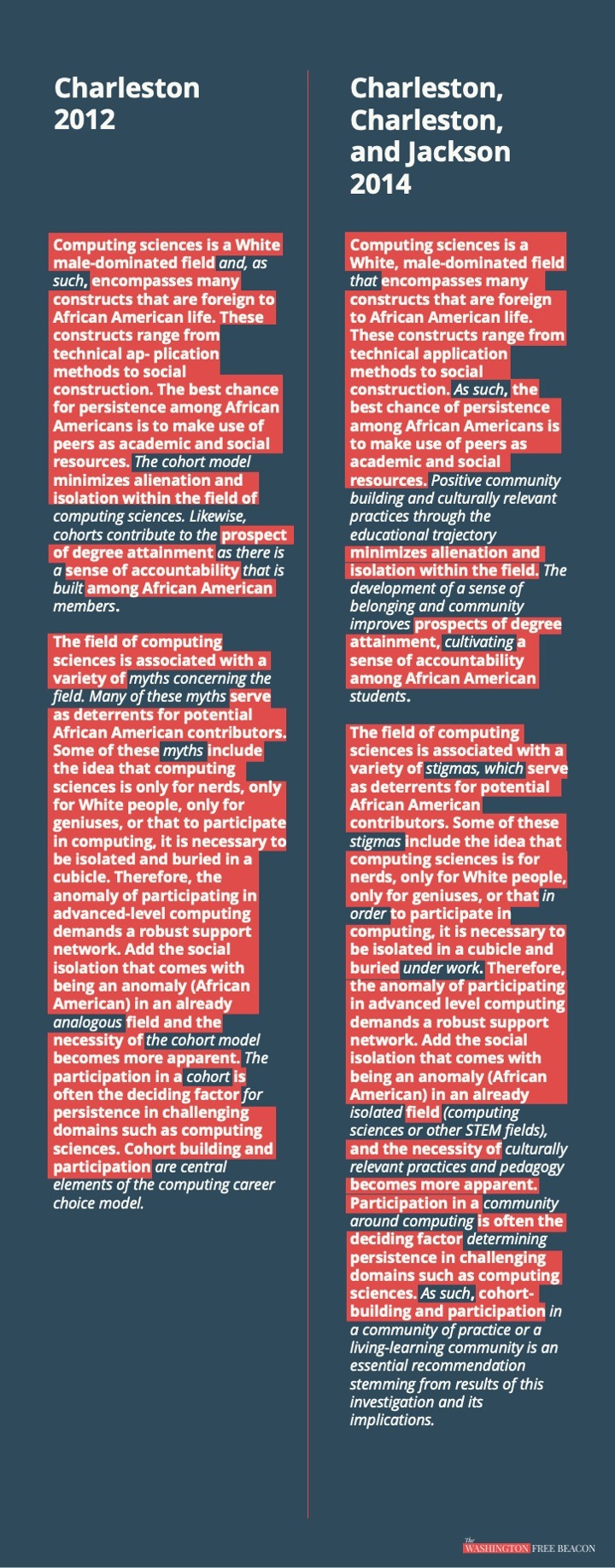
Such language is typical of the diversity initiatives Charleston oversees. Since 2020, her office has pumped out a stream of materials that bemoan the "weaponization of whiteness," discuss the ins and outs of "white fragility," and urge students to "call out" their peers for "harmful words." One message, signed by Charleston herself, was titled "A Call to Dismantle Intersecting Oppressions."
"We must continue to work against systematic oppression in all its forms—racism, sexism, homophobia, ableism, and more," she wrote.
Her office also curates resources for students seeking to become fluent in progressive patois, including a "glossary of diversity, inclusion and belonging (DIB) terms" that provides examples of "gaslighting."
Tactics can include "shooting down the target's ideas," the entry reads—or "taking credit for them."
==
Here we go again...
If you haven't already figured it out, the DEI-related faux-"disciplines" - the "Studies": Ethnic Studies, Women's Studies, Gender Studies, Postcolonial Studies, Media Studies, etc - are the most corrupt, the most ideological with the absolute lowest academic standards of all. All they care about is echoing back the "correct" opinions, not valid scholarship.
And yet, somehow these lunatics and fanatics end up the most powerful people in the asylum.
Harvard needs to fumigate the house, top to bottom.
#Aaron Sibarium#Sherri Ann Charleston#Claudine Gay#Harvard#Harvard University#academic corruption#DEI#DEI bureaucracy#diversity officer#chief diversity officer#diversity equity and inclusion#diversity#equity#inclusion#plagiarism#academic fraud
8 notes
·
View notes
Text
Data Analytics in Climate Change Research | SG Analytics

Corporations, governments, and the public are increasingly aware of the detrimental impacts of climate change on global ecosystems, raising concerns about economic, supply chain, and health vulnerabilities.
Fortunately, data analytics offers a promising approach to strategize effective responses to the climate crisis. By providing insights into the causes and potential solutions of climate change, data analytics plays a crucial role in climate research. Here’s why leveraging data analytics is essential:
The Importance of Data Analytics in Climate Change Research
Understanding Complex Systems
Climate change involves intricate interactions between natural systems—such as the atmosphere, oceans, land, and living organisms—that are interconnected and complex. Data analytics helps researchers analyze vast amounts of data from scholarly and social platforms to uncover patterns and relationships that would be challenging to detect manually. This analytical capability is crucial for studying the causes and effects of climate change.
Informing Policy and Decision-Making
Effective climate action requires evidence-based policies and decisions. Data analytics provides comprehensive insights that equip policymakers with essential information to design and implement sustainable development strategies. These insights are crucial for reducing greenhouse gas emissions, adapting to changing conditions, and protecting vulnerable populations.
Enhancing Predictive Models
Predictive modeling is essential in climate science for forecasting future climate dynamics and evaluating mitigation and adaptation strategies. Advanced data analytics techniques, such as machine learning algorithms, improve the accuracy of predictive models by identifying trends and anomalies in historical climate data.
Applications of Data Analytics in Climate Change Research
Monitoring and Measuring Climate Variables
Data analytics is instrumental in monitoring climate variables like temperature, precipitation, and greenhouse gas concentrations. By integrating data from sources such as satellites and weather stations, researchers can track changes over time and optimize region-specific monitoring efforts.
Assessing Climate Impacts
Analyzing diverse datasets—such as ecological surveys and health statistics—allows researchers to assess the long-term impacts of climate change on biodiversity, food security, and public health. This holistic approach helps in evaluating policy effectiveness and planning adaptation strategies.
Mitigation and Adaptation Strategies
Data analytics supports the development of strategies to mitigate greenhouse gas emissions and enhance resilience. By analyzing data on energy use, transportation patterns, and land use, researchers can identify opportunities for reducing emissions and improving sustainability.
Future Directions in Climate Data Analytics
Big Data and Edge Computing
The increasing volume and complexity of climate data require scalable computing solutions like big data analytics and edge computing. These technologies enable more detailed and accurate analysis of large datasets, enhancing climate research capabilities.
Artificial Intelligence and Machine Learning
AI and ML technologies automate data processing and enhance predictive capabilities in climate research. These advancements enable researchers to model complex climate interactions and improve predictions of future climate scenarios.
Crowdsourced Datasets
Engaging the public in data collection through crowdsourcing enhances the breadth and depth of climate research datasets. Platforms like Weather Underground demonstrate how crowdsourced data can improve weather forecasting and climate research outcomes.
Conclusion
Data analytics is transforming climate change research by providing innovative tools and deeper insights into sustainable climate action. By integrating modern analytical techniques, researchers can address significant global challenges, including carbon emissions and environmental degradation. As technologies evolve, the integration of climate research will continue to play a pivotal role in safeguarding our planet and promoting a sustainable global ecosystem.
2 notes
·
View notes
Text


Sabaragamuwa University of Sri Lanka stands as a beacon of higher education within the verdant landscapes of Belihuloya, nestled in the heart of the Ratnapura District. Established in 1991, it emerged as a testament to Sri Lanka's commitment to fostering academic excellence and expanding educational opportunities across its provinces.
With a robust array of undergraduate and postgraduate programs spanning disciplines as diverse as Natural Sciences, Social Sciences, Humanities, Management Studies, and Agricultural Sciences, the university epitomizes academic diversity and intellectual growth.
Its distinguished faculties, including the Faculty of Social Sciences and Languages, Faculty of Applied Sciences, Faculty of Management Studies, Faculty of Agricultural Sciences, and Faculty of Geomatics, serve as bastions of specialized knowledge, each nurturing a rich tapestry of departments dedicated to their respective fields of study. Additionally, the faculties of Computing, Medicine, and Technology further enrich the academic landscape, ensuring a comprehensive educational experience.
At the heart of its mission lies a commitment to research excellence. Research centers, focal points for scholarly inquiry, delve into critical areas such as agriculture, environmental studies, biodiversity, and social sciences. Here, faculty members and students alike immerse themselves in cutting-edge research, driving innovation and pushing the boundaries of knowledge.
Beyond academia, the university fosters a vibrant campus life. It offers extensive facilities for extracurricular pursuits, sports, and cultural events. Student organizations and clubs abound, nurturing leadership, creativity, and camaraderie among the student body.
In line with its ethos of service and community engagement, Sabaragamuwa University actively collaborates with local communities and organizations. Through outreach programs and collaborative initiatives, it addresses pressing societal issues, fostering regional development and social progress.
The accolades garnered over the years bear testament to the university's unwavering commitment to academic excellence. Sabaragamuwa University stands as a pillar of higher education in Sri Lanka, shaping the intellectual landscape and driving socio-economic advancement across the region.
visit our web site to see the greenery of sabaragamuwa university and many more : https://www.sab.ac.lk/
2 notes
·
View notes
Text
This week in people trying to overextend their Degrees...
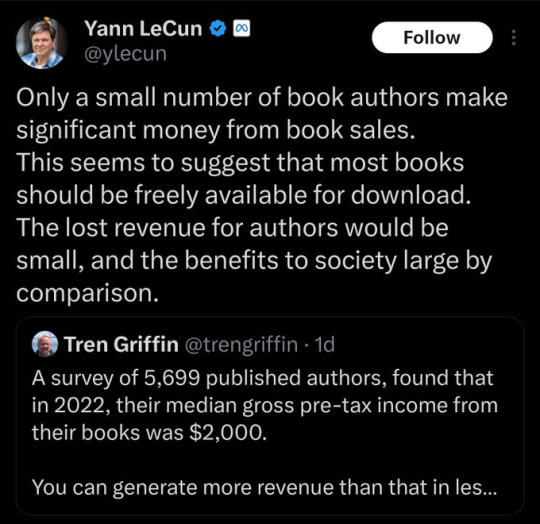
https://twitter.com/ylecun/status/1742233111037870259
Original comment I'm responding to:
I'm afraid you totally misunderstood my point. 1. Many authors I know are more motivated by the impact of their intellectual productions than by the income it might generate through books and other publications. 2. Many of them face the following trade-off: will I give up income in exchange for increased readership by making my book free for download, or will I generate income while decreasing readership by charging for my book? (Note that offering a free download does not preclude also selling physical books). 3. The calculus is this: since the expected income has a 50% chance of being below $2000, I'm not going to drop my day job. Perhaps I should give up on what is likely to be a modest short-term income and maximize prestige and recognition instead. Prestige and recognition through intellectual impact can turn into future income (e.g. by getting a prestigious position). 4. Lots of people in the academic world have made this calculus and have offered their books for free download. Some of them simultaneously offer print version through publishers who don't mind (generally some non-profit university press). 5. Many of those people have realized that the free download, instead of reducing printed sales, actually *increases* sales. There are famous examples. 6. Academics are very familiar with the idea that you don't get paid directly for your writings. Scholarly publications (and talks) do not generate any income (in fact, they can cost money!). The income is indirect: intellectual or artistic impact is a precondition to a position in academia or industry research labs. 7. Computer scientists are also familiar with the concept. It's called open source software. You give away your software for free. Sometimes, your employer pays you to do so. Sometimes, you just want to make a name for yourself by contributing to an important project. 8. A similar phenomenon exists in music, particularly in jazz: a number of jazz musicians achieve financial stability through a teaching position at a university or conservatory. Additional income comes from performance. They get almost nothing from recordings. I'm not suggesting people shouldn't get paid for their work. In fact, I find it quite sad that most people can't live off of their creative work. If you can make a living by selling your books, music, or video games, more power to you! But I'm wondering whether the modus operandi that is prevalent in the academic world and the open source software world could not apply to other types of intellectual and artistic production. It may cause some creative productions to exist that would not otherwise see the light of day because of lack of commercial interest from publishers.
1. Many authors I know are more motivated by the impact of their intellectual productions than by the income it might generate through books and other publications.
Many Who? Did you read #Publishingpaidme? No? Really? Did you see the last person who declared something like this and people jumping on them—it was an agent? You haven't been paying attention. Many who? Cite your sources. Do you have sources or any publishing experience in novels? I have industry experience and I can cite sources beyond one article. Should we start with Bisheng in China?
Authors and writers who do creative works are more desperate, but want to be paid and paid fairly.
Backing into the "many" without citation creates a fallacy. You can do better as someone who teaches at NYU and has a degree teaching computer science. (Though no lie in my last project on story structure, professors were the worst at citations. And yes, I can name names with that and posted long and ranted long about that and their plagiarism.)
2. Many of them face the following trade-off: will I give up income in exchange for increased readership by making my book free for download, or will I generate income while decreasing readership by charging for my book? (Note that offering a free download does not preclude also selling physical books).
This is because society, in general misinterprets creativity and devalues it as a "real skill" It has nothing really to do with your first assumption. Much like AI often pulls from large creative datasets and devalues creativity and artists' skillsets.
Also, this doesn't prove to be true, but then you haven't really looked at selling models for books. There are more complicated things going on that you don't know and aren't accounting for.
Like the psychology of reviewers and trying to game for more reviewers when your book isn't getting attention, which you would know if you knew the last debacle with the whole gaming the Goodreads reviews by over reviewing.
The calculus is this: since the expected income has a 50% chance of being below $2000, I'm not going to drop my day job. Perhaps I should give up on what is likely to be a modest short-term income and maximize prestige and recognition instead. Prestige and recognition through intellectual impact can turn into future income (e.g. by getting a prestigious position).
Ummm… this isn't calculus. Did you take Calculus? I did This seems like a mix of unsupported statistics pulling numbers wherever you feel like it without cross referencing.
You're trying to use fancy words to sound smarter while proving you don't seem to understand basic psychology and don't know how publishing, artists, or self-publishing works.
Most artists don't do things for prestige value. They don't want to be famous. It's more like sharing is caring. This might be your value set, but it's not everyone's. Have you interacted with artists and creatives? The majority of the time we're swapping different techniques and trying to help each other to the top, again, see Xiran's expose on Goodreads debacle.
For those who want to be famous, etc, you know what they preach over and over again? Don't fuck this up for the rest of the artists: Make sure you get paid for your art.
Do you need a name? John Scalzi. He is famous for saying both things.
You need another name? Harlan Ellison. Harlan Ellison argued freaking hard for this. He won court cases for us. He is famous for preaching over and over again to make sure you get paid while also wanting the prestige.
Most artists that want prestige alone don't survive in the publishing industry. It simply doesn't work because you need the skill set to go with it, and there are certainly less masochistic ways to gain prestige.
You have who exactly? Desperation isn't the same as knowing marketing skills.
Lots of people in the academic world have made this calculus and have offered their books for free download. Some of them simultaneously offer print version through publishers who don't mind (generally some non-profit university press).
This isn't calculus either. Many who? This is also false equivalency. There is a faster road and more sure road to this than getting a novel published or a nonfiction book published. You should realize the fallacy of this and also be able to own you just don't know the artists that create the art you're claiming on.
Many of those people have realized that the free download, instead of reducing printed sales, actually increases sales. There are famous examples.
No. It increases customer dissatisfaction, actually to give things away from free. I can cite Mur Lafferty with a lot of interviews with self-publishers. You have who, exactly to back your assertion?
Second one backs the assertion. I could go more academic, but it's not like you're pulling anything to support your assertions, despite being an NYU professor.
It's actually a higher satisfaction rate to charge for your book rather than to give it out for free. You get better reviews. So when people charged 1.99 for their books over free, the amount of reviews and reviewer satisfaction went up. This might be inverse of what you expect, but this is well-known among self-pubbed authors.
Psychologically, this is inverse because sometimes people think cheap is lower quality. And free is the equivalent of a mattress left on the curb–it must be used and worn and not very good–in fact it might have bed bugs.
Academics are very familiar with the idea that you don't get paid directly for your writings. Scholarly publications (and talks) do not generate any income (in fact, they can cost money!). The income is indirect: intellectual or artistic impact is a precondition to a position in academia or industry research labs.
Academics is not the same thing. You're asserting that you know because oranges are also fruit like apples, so growing oranges must be exactly like apples. That's not the case. Because Academia takes a different skill set, but a related skill set from creating books in the creative sphere. It doesn't seem you have enough publishing knowledge to back your claim, so you try to make a related claim and then claim the feelings around it must be the same.
Because the proess of publishing nonfiction and novels and short stories is different from academia, the atmosphere and the reasons why people want to publish or have a publishing career also change. There is a lot of difference in this industry compared to academia.
But it's not. It simply is not. Also, academic papers get better pay than your average article. Ask me how I know this. I fucking looked it up. You get better residuals too, in the form of prestige means you get better pay in your career itself. It doesn't work this way in general publishing. You can fuck up one day and lose your entire career. The publisher says goodbye, no more sorry, you didn't sell well that we no longer want your books. BTW, you need a reference? Brandon Sanderson said this on Writing excuses that he felt lucky that he's been able to have a continued career in this regard.
Computer scientists are also familiar with the concept. It's called open source software. You give away your software for free. Sometimes, your employer pays you to do so. Sometimes, you just want to make a name for yourself by contributing to an important project.
Open source software is totally a different type of field and psychology from what you're arguing here. Also false equivalency and computer science as a core career pays well, that people can do it for prestige? No. They want to innovate the field further and try to find other computer programmers and learn and explore things.
My Dad was a computer engineer. I know this from personal experience of being near computer engineers. I know how they think. I also worked professionally in UX. You're thinking the psychology must be the same without experiencing the people. This is over extending.
A similar phenomenon exists in music, particularly in jazz: a number of jazz musicians achieve financial stability through a teaching position at a university or conservatory. Additional income comes from performance. They get almost nothing from recordings. I'm not suggesting people shouldn't get paid for their work. In fact, I find it quite sad that most people can't live off of their creative work. If you can make a living by selling your books, music, or video games, more power to you! But I'm wondering whether the modus operandi that is prevalent in the academic world and the open source software world could not apply to other types of intellectual and artistic production. It may cause some creative productions to exist that would not otherwise see the light of day because of lack of commercial interest from publishers.
No. You're jumping in order to cover your lack of knowledge of a thing. Focus on the feelings of the publishing industry. Show your knowledge of the people that produce books.
Jazz Musicians don't have the same psychology either.
So, in total, you're confessing you don't know anything about publishing industry, how it operates and who is working in it and for what reasons, but assert you must know because apples are fruit like oranges, so you have to be growing apples and oranges in the exact same way–don't you water them and put them into full sun? So then you must be able to understand that how you grow them and the pests that come onto them and the things the farmers have to care about as an apple grower and an orange grower must be exactly the same.
This is how your argument sounds like. Why not actually do the investigating and stop spitballing and, ya know, act like an academic and ASK THE PEOPLE and stop doing your backfire effect in the wrong way?
Also, it might behoove you to look into scams writers face and why people fall for those scams.
BTW, Anthropology Degree and minor in comp lit. Also published. So yeah, I know what I'm doing when I pick on your argument.
#writing advice#problems with academia#stop misusing your degrees#investigate and actually have citations before making big false claims#fuck it as artists get paid
2 notes
·
View notes
Text
Best Assignment Help Experts for Students in Singapore, UAE, UK, USA, and More

In today’s competitive scholastic environment, understudies frequently confront gigantic weight to exceed expectations in their ponders whereas adjusting numerous duties. Whether it’s a tight due date, complex subject matter, or need of assets, scholastic challenges are common over all instructive levels. This is where proficient task offer assistance administrations play a pivotal part. If you're looking for the best task offer assistance specialists, you’ve come to the right put. Our group of prepared scholastic experts gives high-quality, solid, and convenient assignment assistance in Singapore, Unused Zealand, the Joined together Middle easterner Emirates (UAE), Canada, the United Kingdom (UK), the United States (USA), and Australia.
Why Select Our Assignment Help Experts?
Our Best Assignment Help Experts are devoted to making a difference understudies accomplish scholarly victory by advertising customized arrangements custom-made to person needs. Here’s why understudies over the globe believe our services:
Expert Writers Over Disciplines We have a group of profoundly qualified scholars with mastery in different areas counting administration, nursing, law, building, computer science, fund, and humanities. Each task is taken care of by a subject-specific master who guarantees the substance is precise, well-researched, and adjusted with college guidelines.
Plagiarism-Free Content Originality is at the heart of our benefit. All assignments are composed from scratch and go through thorough plagiarization checks utilizing industry-leading apparatuses to guarantee 100% realness. We moreover give copyright infringement reports upon ask for included assurance.
Opportune Delivery We get it the significance of assembly due dates. Our journalists are prepared to work productively beneath weight, guaranteeing your assignments are conveyed on time—every time. Whether it's a last-minute exposition or a point by point paper, we’ve got you covered.
24/7 Client Support Our devoted client benefit group is accessible around the clock to help you. Whether you require upgrades on your task or have questions almost our administrations, we are continuously here to help.
Reasonable Pricing We offer high-quality task offer assistance at student-friendly costs. With a assortment of rebates, referral programs, and regular offers, our administrations are outlined to be available to all understudies without compromising on quality.
Global Reach with Neighborhood Understanding
Our task offer assistance administrations are trusted by understudies in:
. Singapore – Known for its thorough scholastic benchmarks, understudies in Singapore depend on our custom fitted help to meet their university’s expectations.
. New Zealand – We offer master direction that adjusts with New Zealand’s instructive system, making a difference understudies perform superior academically.
. United Middle easterner Emirates (UAE) – We back understudies in beat colleges over Dubai, Abu Dhabi, and other emirates with assignments that reflect nearby scholarly norms.
. Canada – From Toronto to Vancouver, our specialists offer assistance Canadian understudies handle assignments in different designs counting papers, case ponders, and lab reports.
. United Kingdom (UK) – With a center on UK educational programs benchmarks, our administrations guarantee understudies meet the evaluating criteria of beat UK institutions.
. United States (USA) – We get it the assorted scholarly prerequisites of American colleges and give custom-made arrangements accordingly.
. Australia – Our scholars are well-versed with Australian college rules, guaranteeing understudies get the offer assistance they require to succeed.
Trusted by Thousands of Understudies Worldwide
Over the a long time, our notoriety as a trusted supplier of task offer assistance administrations has developed gigantically. Thousands of understudies have accomplished scholarly victory with our bolster. Our tributes and positive surveys talk volumes almost our commitment to quality and understudy satisfaction.
Conclusion
If you’re looking for the Best Assignment Help Experts, see no assist. Whether you're in Singapore, Modern Zealand, UAE, Canada, UK, USA, or Australia, we are here to bolster you each step of the way. From expositions and reports to complex theses, our Best Assignment Help Expert team is prepared to provide brilliance. Reach out nowadays and take the to begin with step towards scholarly victory with master direction you can believe.
#assignment help experts#best assignment help experts#best assignment help expert#corporate finance assignment help#business intelligence assignment assistance#database management assignment assistance#last minute assignment help
0 notes
Text
How to Pursue a PhD in Chemistry: A Complete Guide
Pursuing a PhD in Chemistry is a major academic and professional milestone. Whether your goal is to contribute to cutting-edge research, enter academia, or advance in the pharmaceutical or chemical industries, a doctorate equips you with the skills and credibility to thrive. Here's a complete guide to help you understand the process from start to finish.

Understand What a PhD in Chemistry Entails
A PhD in Chemistry is a research-focused degree that typically takes 4–6 years to complete. It involves advanced coursework, comprehensive exams, and a major original research project culminating in a dissertation. Specializations can include:
Organic Chemistry
Inorganic Chemistry
Physical Chemistry
Analytical Chemistry
Biochemistry
Materials Science
Theoretical/Computational Chemistry
You will work under the guidance of a supervisor, contributing new knowledge to your field and publishing in peer-reviewed journals.
2. Meet the Basic Eligibility Criteria
Most PhD programs require:
A Master’s degree (M.Sc.) in Chemistry or a closely related field
Strong academic performance (typically a GPA of 3.0/4.0 or equivalent)
Letters of recommendation
Statement of purpose (SOP) outlining research interests
Research experience (preferred, but not always required)
Some universities may accept exceptional candidates with just a Bachelor’s degree, especially in the U.S.
3. Choose Your Area of Research Interest
Before applying, identify the area of chemistry you're most passionate about. This helps you:
Narrow down suitable programs
Find potential supervisors whose research aligns with your interests
Write a compelling SOP tailored to specific departments
Review recent papers, attend webinars, or speak with current PhD students to gain clarity.
4. Prepare for Entrance Exams
Depending on your location and target universities, you may need to take standardized tests:
GRE (Graduate Record Examination) – Required by some U.S. universities
TOEFL/IELTS – For non-native English speakers applying to international programs
CSIR-NET/GATE – Required for admission or funding in India
Check individual university requirements carefully.
5. Apply to the Right Universities
Shortlist institutions based on:
Research output
Faculty expertise
Funding opportunities
Lab facilities
Industry connections
Applications generally include academic transcripts, test scores, SOP, resume/CV, and letters of recommendation. Most deadlines fall between November and February for Fall admission.
6. Secure Funding
PhD programs often offer financial support through:
Teaching assistantships (TA)
Research assistantships (RA)
Fellowships or scholarships
Make sure to apply for external funding as well (e.g., UGC-NET JRF in India, NSF fellowships in the U.S., or DAAD in Germany).
7. Interview and Acceptance
Some programs may conduct interviews to assess your fit with the department and potential advisor. Be prepared to discuss:
Your academic background
Research interests
Long-term goals
Why you chose their program
Once accepted, you'll receive an offer letter outlining funding, expectations, and start date.
8. Begin the Program
Your PhD journey typically involves:
Coursework (1–2 years): Advanced classes in chemistry and research methods
Comprehensive exams: To assess your readiness for research
Research proposal: Defining the scope and methodology of your dissertation
Lab work: Intensive experiments, data collection, and analysis
Dissertation writing: Documenting your findings in a scholarly format
Defense: Presenting and defending your research before a committee
9. Career Opportunities After a PhD in Chemistry
With a PhD, you can pursue:
Academia (Postdoctoral research, Professorship)
R&D in pharmaceuticals, biotechnology, and materials science
Chemical manufacturing and process industries
Government or defense research labs
Scientific writing, patent law, or consulting
Final Tips:
Stay curious and resilient – research is a marathon, not a sprint.
Network with peers, attend conferences, and seek mentorship.
Keep publishing and updating your skills (e.g., in data analysis or AI in chemistry).
A PhD in Chemistry is demanding but deeply rewarding. With the right preparation and mindset, you can carve out a meaningful and impactful career.
0 notes
Text
Mr. Muneer Abass
Social Science Teacher & Research Scholar
Sultan Mohalla, Saida Kadal, Ranger Stop, Srinagar
Contact: 9596104749
Email: [email protected]
Subject: Heartfelt Appreciation for Your Scholarly Contributions (May 2024 – May 2025)
Dear Mr. Muneer Abass,
We are pleased to extend our deepest appreciation and sincere congratulations for your remarkable efforts and consistent commitment to educational and social awareness through your written contributions over the past year.
As a dedicated Social Science Teacher, Research Scholar, and National UN Volunteer, your insightful articles have addressed a wide range of critical issues affecting education, society, and human development. Your academic qualifications—M.A., B.Ed., NET, and Diploma in Computer—further amplify the impact of your writing.
Your contributions from May 2024 to May 2025 include the following published works:
1. Dreams in Chains: The Crisis of Forced Subject Choices After Class 10
2. Bullying is a Serious Problem in Many Schools
3. The Silent Decay of Our Historical Monuments – A Call to Action
4. Exam Scams and Delays: A Catalyst for Rising Educational Unemployment in India
5. Unprofessionality and Lack of Subject Knowledge: Eroding the Role of Teachers and Education in Society
6. Students Struggle with Daily Challenges in Modern Academic Life
7. Exploring Nature: The Benefits of Summer Camps for School Students
8. Choosing a Career: Deliberate Decision for a Fulfilling Future – By Choice, Not by Chance
9. The New Education NEP Policy and the Common People's Thoughts
10. The Message of Karbala – The Open University to Learn
11. The Way to Control Zero Hunger
12. Dr. B.R. Ambedkar: The Architect of India’s Unity in Diversity
Each of these reflects your keen social insight, your passion for reform, and your firm belief in education as a tool for transformation. Through your words, you have empowered minds and strengthened the foundation of civic thought and ethical responsibility.
We at National UN Volunteers – India are proud to have you as part of our community. Your work exemplifies the spirit of volunteerism, scholarship, and civic leadership that this nation urgently needs.
We look forward to your continued contributions and wish you success in all your future endeavors.
With gratitude and respect,

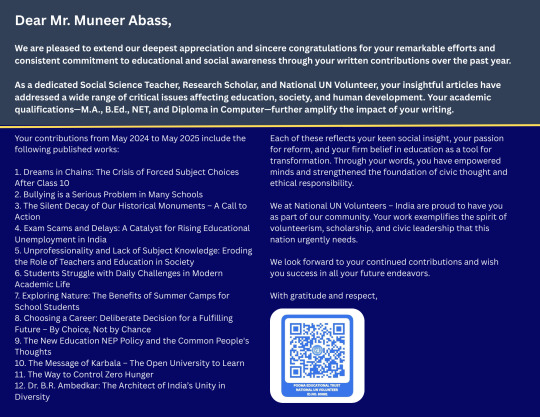
0 notes
Text
0 notes
Text
Expert AI and Machine Learning Dissertation Writing and Coding Services for UK Students
Are you working on a master’s dissertation in Artificial Intelligence (AI), Machine Learning (ML), Data Science, or Computer Science? Struggling with algorithm design, coding implementation, or structuring your thesis? At Tutors India, we offer specialized dissertation writing and editing services tailored for UK-based undergraduate and postgraduate students. Our expertise lies in supporting complex AI and ML dissertation projects—from ideation to execution.
Why Choose Our AI & ML Dissertation Coding Services in the UK?
Writing a master's dissertation that involves algorithmic modeling or machine learning implementation requires more than just technical know-how—it demands precision, clean code, academic rigor, and deep analytical thinking. Our Masters dissertation coding support ensures your research is not only technically robust but also aligned with your university’s academic standards.
Our Services Include:
Algorithm design and development
Machine learning model implementation
Python, R, MATLAB, and Java programming
Data preprocessing, modeling, and visualization
Dissertation writing, structuring, and academic editing
Proofreading and compliance with UK university guidelines
Complete Dissertation Development & Technical Support
Our full spectrum Master’s (Undergraduate) thesis development services guide you through every phase of your project:
Topic selection and proposal writing
Literature review synthesis
Research methodology design
Custom algorithm development and simulation
Technical documentation and results interpretation
Dissertation editing and formatting (APA, Harvard, etc.)
Whether you’re developing supervised learning algorithms, conducting time-series analysis, or building neural networks, our experienced developers and academic writers work hand-in-hand to ensure clarity, accuracy, and scholarly impact.
Specialized Algorithm Design and Optimization for Academic Projects
Our Algorithm Development Services UK are ideal for dissertations involving:
Predictive modeling
Optimization techniques
Deep learning architectures (CNNs, RNNs)
Data mining and feature selection
Reinforcement learning models
We ensure every algorithm is designed with academic integrity, documented with clarity, and tested for performance and accuracy. Whether your goal is to simulate real-world scenarios or derive new theoretical insights, we’ll help you engineer a solution that aligns with both academic and technical benchmarks.
Why UK Students Trust Tutors India
Proven expertise in AI/ML dissertation support
Technically proficient team of PhDs, data scientists, and software engineers
Customized, plagiarism-free content
Support across all UK universities and academic styles
24/7 academic consultation and revision handling
With years of experience in dissertation writing and editing services, Tutors India stands as a trusted academic and mentoring partner for students pursuing MSc, MEng, or MPhil dissertations in Artificial Intelligence, Data Analytics, and Machine Learning.
Start Your Dissertation Journey with Confidence
Don’t let coding complexities or technical writing challenges hinder your progress. With Tutors India, you receive more than just assistance—you gain a strategic partner committed to your academic excellence. Whether you need AI dissertation writing help, algorithm development guidance, or machine learning implementation support, we’re ready to assist you at every step.
Contact us today to get started on your Masters dissertation in AI or Machine Learning and secure the academic support you need to succeed.
0 notes
Text
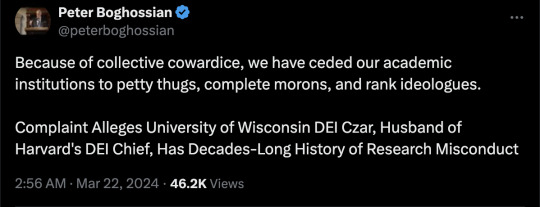
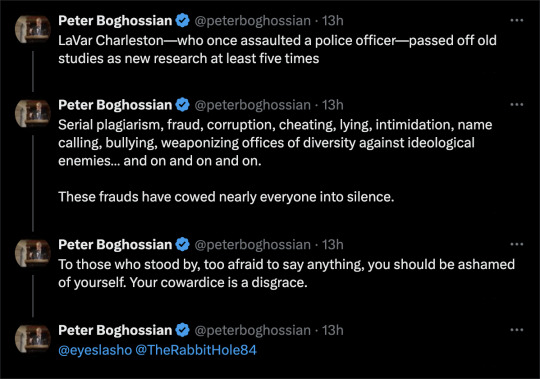
By: Aaron Sibarium
Published: Mar 21, 2024
LaVar Charleston—who once assaulted a police officer—passed off old studies as new research at least five times
The chief diversity officer of the University of Wisconsin-Madison, LaVar Charleston, who also teaches at the university’s school of education, has a decades-long track record of research misconduct, according to a complaint filed with the university on Wednesday and a Washington Free Beacon analysis. That misconduct includes presenting old studies as new research, which he has done at least five times over the course of his career.
The complaint, which was filed anonymously, implicates eight of Charleston’s publications, many of them coauthored, and accuses him of plagiarizing other scholars as well as duplicating his own work. It comes as the university is already investigating Charleston over a separate complaint filed in January, alleging that a 2014 study by him and his wife—Harvard University’s chief diversity officer, Sherri Ann Charleston—is a facsimile of a study he published in 2012.
"This is an extraordinary case of serial misrepresentation and deception," said Peter Wood, the head of the National Association of Scholars and a former associate provost at Boston University. "The closest analogy would be someone who sells the same real estate to five different buyers, all of whom are unaware of the others."
In January, Charleston won a lifetime achievement award for "excellence in higher education." The university trumpeted the award in a press release, praising his "unwavering dedication to creating inclusive environments in academia" and noting his "wealth of academic accolades."
Charleston’s CV, however, appears to have been inflated by duplicate publication, the practice of publishing the same research in multiple journals without attribution. In 2014, for example, he published a pair of papers in two separate journals—the Journal of Diversity in Higher Education and the Journal of Progressive Policy & Practice—that are near-verbatim copies of each other.
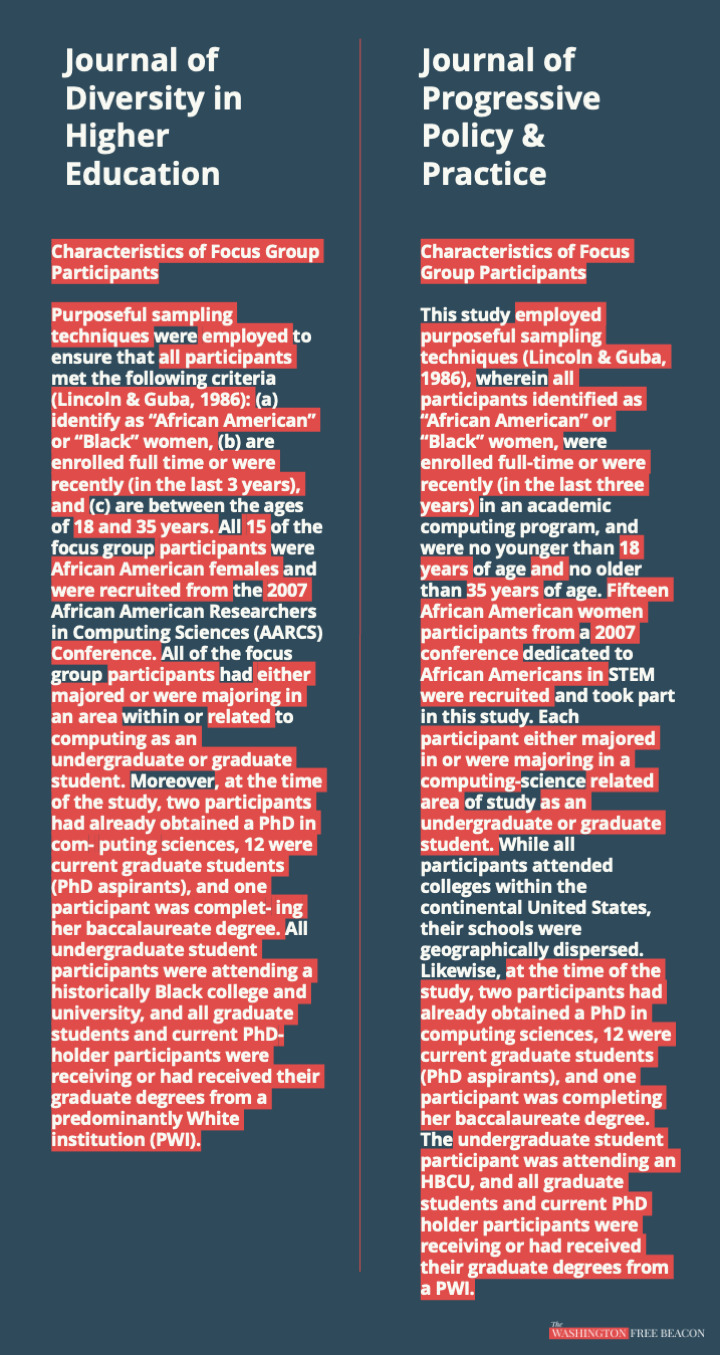
Both describe a 15-person focus group conducted by an African-American woman and feature identical quotes from participants, all of whom appear to have been recruited from the same academic conference.
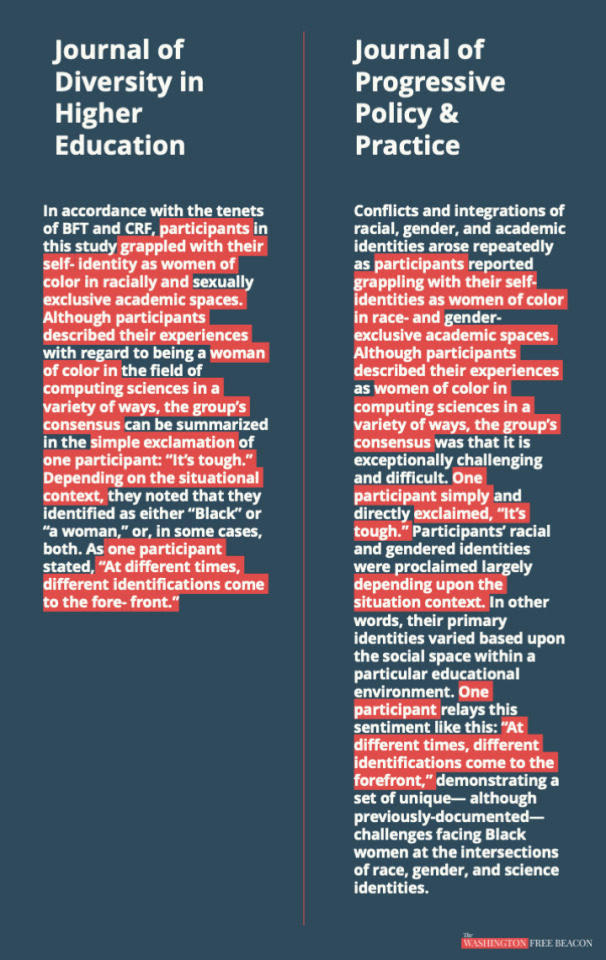
Neither paper indicates the other was published elsewhere—a troubling omission, scholars who reviewed both studies said.
"It is academic misconduct to publish essentially the same paper twice with no acknowledgment of the duplication," Alexander Riley, a sociologist at Bucknell University, told the Free Beacon. "It seems fairly clear that Charleston is gaming the system in order to get more on his CV than is merited by the amount of research he has actually done."
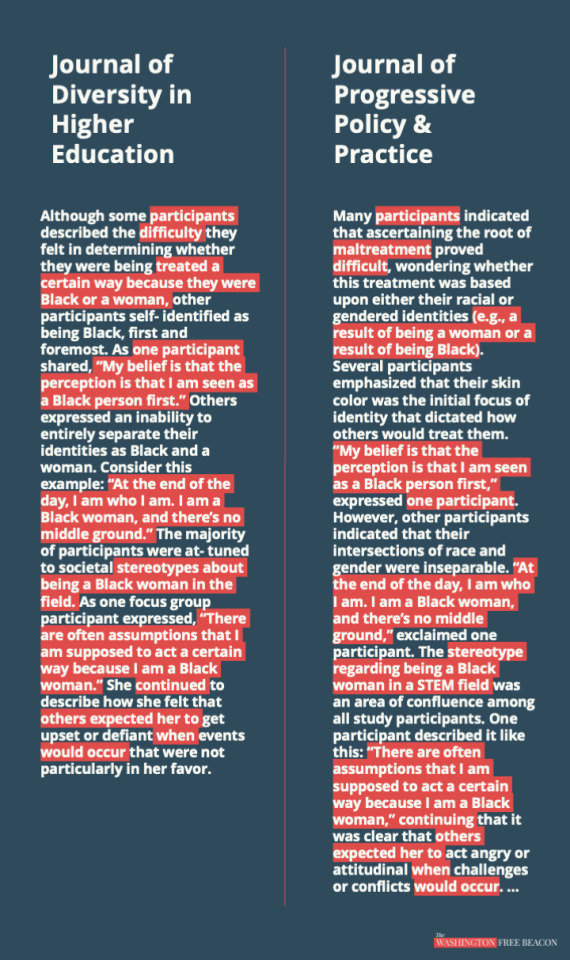
Charleston also appears to have recycled findings and interview responses from his 2010 dissertation, which involved a survey of black computer science students, in four subsequent papers: the 2012 and 2014 studies that were the subject of the previous complaint, as well as two additional studies published in 2016 and 2022.
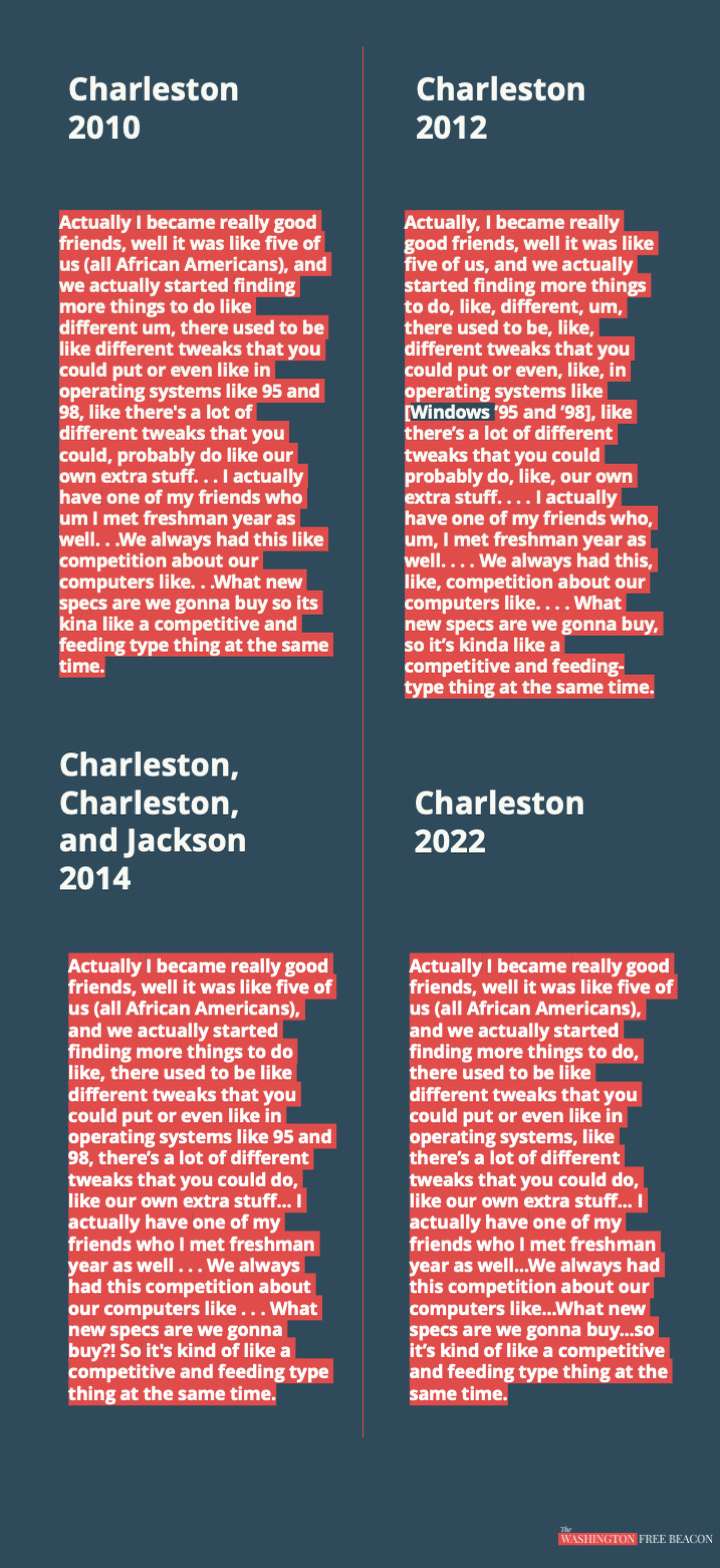
Each study is framed as a novel survey addressing a gap in the scholarly literature. None cite Charleston’s dissertation or indicate that they are drawing on previously published material.
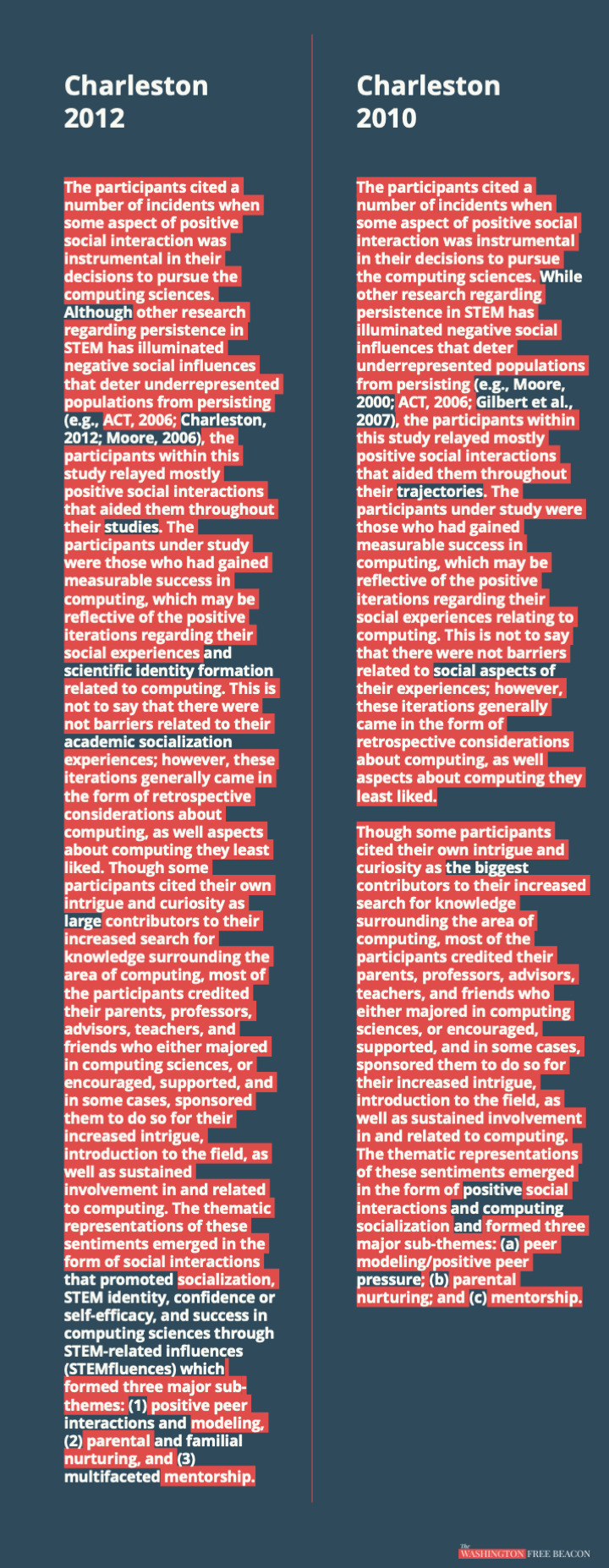
The odds that different people would give the same quotes across different studies, said Lee Jussim, a professor of psychology at Rutgers University, are about the same as the odds that "monkeys typing on typewriters would reproduce Hamlet."
Charleston did not respond to a request for comment.
The complaint raises serious questions about how a flagship public university vetted one of its top administrators, whose career has been marked not just by questionable research practices but by criminal conduct.
Shortly after joining UW-Madison as a researcher in 2009, Charleston was charged in 2011 with attempting to strangle a police officer, according to documents obtained by the MacIver Institute, a conservative think tank in Wisconsin. He avoided a conviction through the Deferred Prosecution Program, a local initiative run by the district attorney’s office that offers first-time felons the chance to do community service in lieu of jail time and removes their arrest records from public databases.
"Even with a PhD, I’m looked at as a criminal," Charleston said in an interview in 2020. "[I]t has to be because of my color."
The arrest didn’t stop Charleston from climbing the ranks of the school’s diversity bureaucracy. Between 2010 and 2017, he helped to build Wisconsin’s Equity and Inclusion Laboratory, which conducts research on "inclusive learning." He became assistant vice chancellor of student diversity at the University of Wisconsin-Whitewater in 2017, then served as the inaugural dean of diversity, equity and inclusion at UW-Madison’s School of Education—the third-ranked education school in the country, according to US News and World Report. He became the chief diversity officer of the entire university in 2021.
Charleston is also a clinical professor of education, has led "anti-racism" workshops for Wisconsin public school teachers, and sits on the state’s Equity and Inclusion Council, which helps "advance diversity, equity, and inclusion practices across Wisconsin state government."
The complaint calls into question the originality of the feted diversity scholar, who draws a $280,000 salary from UW-Madison and oversees tutoring services for students.
"The two 2014 papers do indeed appear to be two versions of the same paper," Riley said. "I don't see the two as distinct from one another in any substantive way."
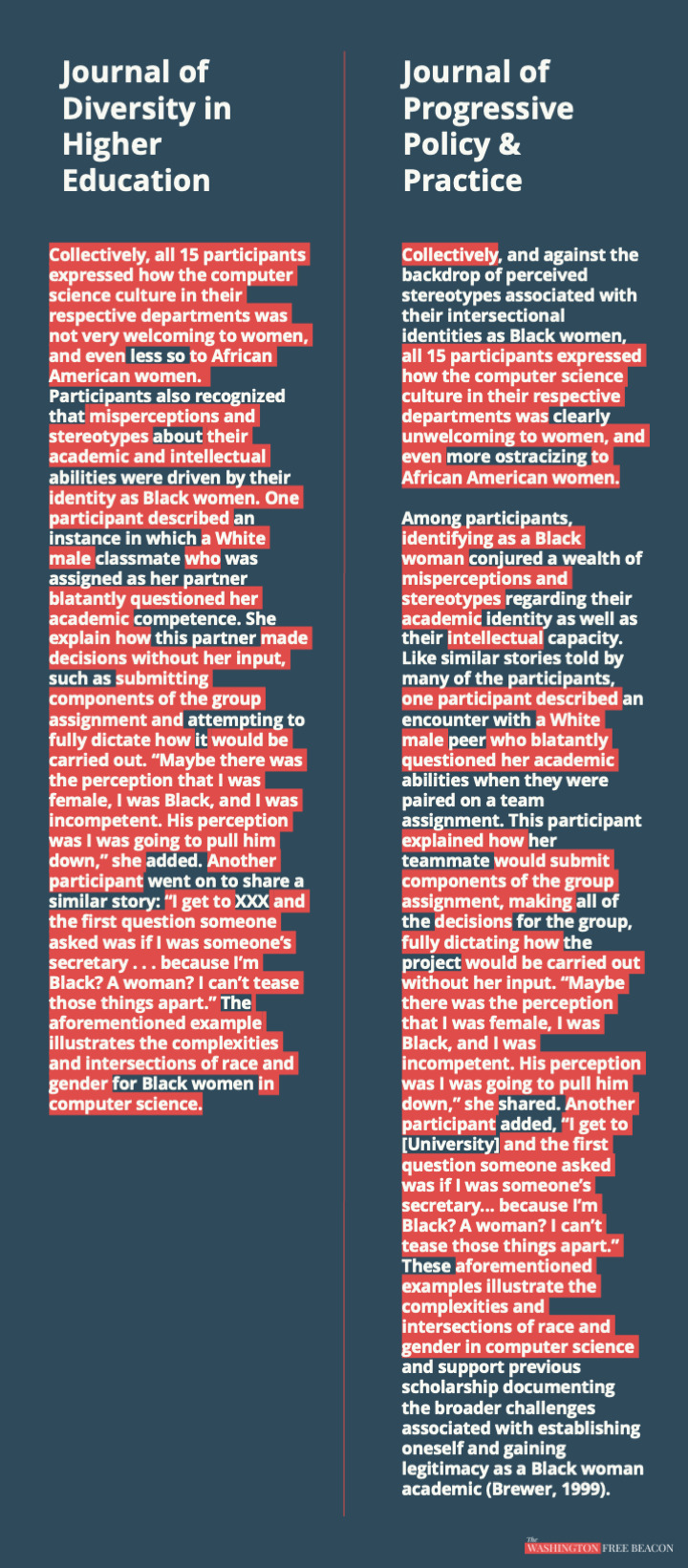
Both papers also share a prominent coauthor: Jerlando Jackson, now the dean of the Michigan State University College of Education, who advised Charleston’s dissertation at UW-Madison and also coauthored one of the studies based on it. The overlap raises additional questions about norms of academic integrity at education schools and within the field of DEI scholarship, which has come under intense scrutiny in recent months amid a drip-drip of plagiarism scandals.
"Either [Charleston and Jackson] are ignorant of this principle of research publication ethics," Riley said, referring to rules against duplicate publication, "or they were both aware of what they were doing."
Jackson did not respond to a request for comment.
The University of Wisconsin-Madison said it"takes all allegations of research misconduct seriously" and that it would investigate the complaint. Charleston, the school added, is a "valued member of the University of Wisconsin-Madison leadership team and we continue to support his work."
Wednesday’s complaint marks the fourth time this year that a DEI official has been hit with charges of research misconduct. In addition to Sherri Ann Charleston, Harvard’s chief diversity officer, plagiarism allegations have been made against Shirley Green, the Title IX coordinator for Harvard Extension School, and Alade McKen, the chief diversity officer of Columbia Medical School. The deluge followed the downfall of former Harvard president Claudine Gay, who resigned in January after half of her published work was found to contain plagiarized material.
Unlike those other officials, who work for private universities with lavish endowments, Charleston is a government employee subject to a state budget. His role was on the chopping block last year after Wisconsin Republicans proposed a budget that would have cut $32 million from the UW system—the exact amount it spends on DEI initiatives.
A watered-down version of the proposal still drew fierce blowback from the University of Wisconsin Board of Regents, which in December rejected a deal to cap DEI staff in exchange for pay raises and a new engineering school. The board reversed course after news broke that it had prioritized positions like Charleston’s over $800 million in additional funding.
That money has subsidized a scholar who appears to have little new to say. The four studies based on Charleston’s dissertation, which was submitted to the University of Wisconsin-Madison, are strikingly similar to each other, regurgitating not just interview results but entire pages of text.
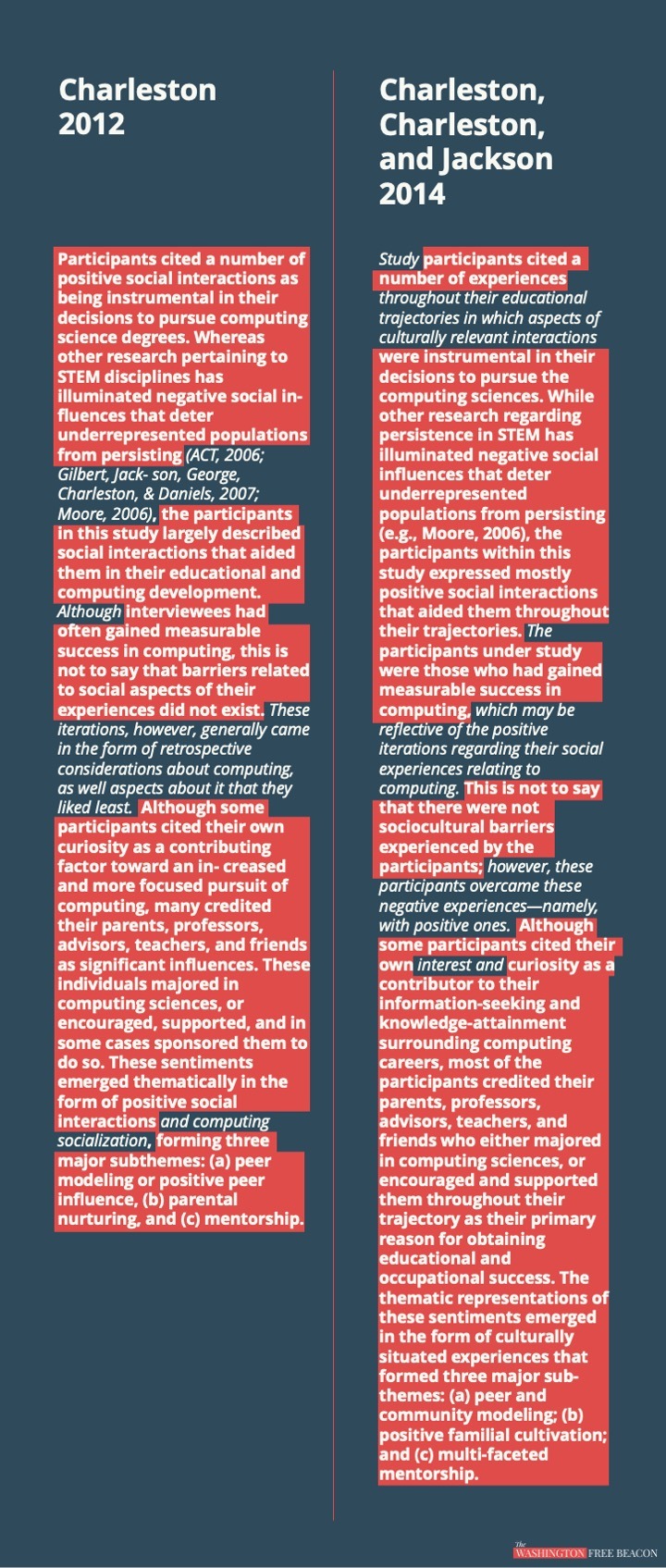
Each one discusses the challenges faced by African-American science students and argues, among other things, that mentorship can promote success in computer science. Three of the four studies include identical descriptions of survey participants, whose testimonials form the backbone for each paper.
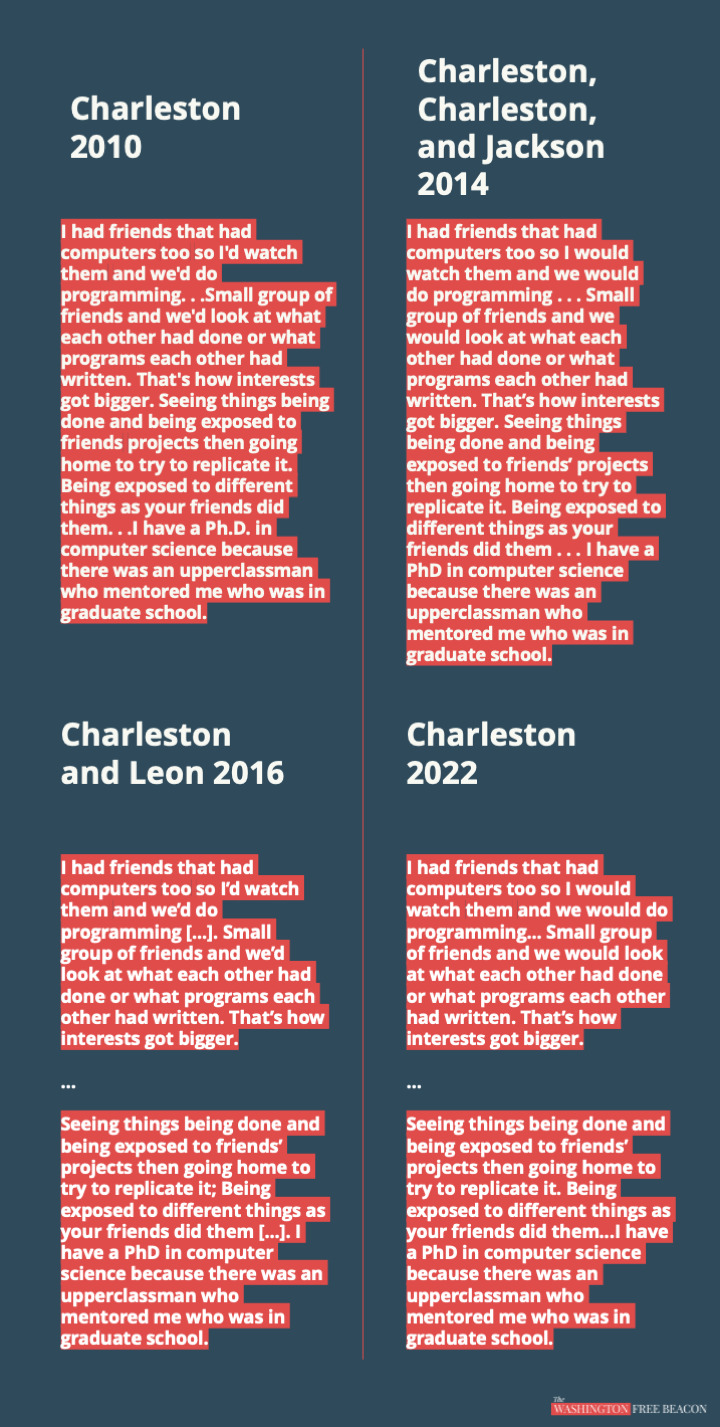
"I know of no other cases where a researcher has simply repeated his dissertation findings like a broken record for twelve years," Wood said.
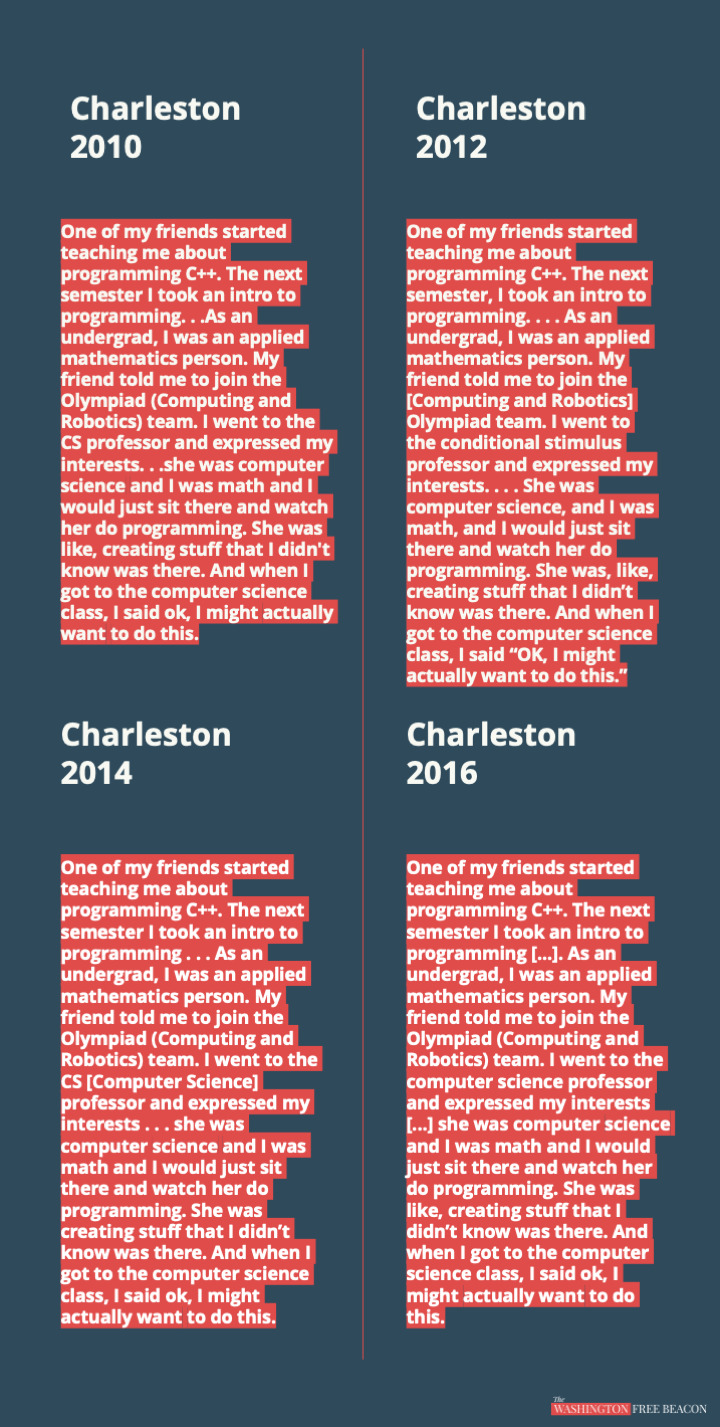
While scholars can reuse data as much as they like and often turn their dissertations into peer-reviewed articles, they are expected to provide appropriate attribution to earlier research if it has already appeared in an academic journal. Failure to do so can result in retractions and infringe on the copyright of the publisher.
Duplicate publication is sometimes considered a more serious offense than plagiarism because, on top of stealing a journal’s intellectual property and padding a scholar’s CV, it biases meta-analyses—papers that aggregate the results of prior studies and use them to make statistical generalizations about a body of research. Some meta-analyses in education focus on the very issues Charleston’s work has addressed, including the effects of mentorship and diversity training.
Riley, the Bucknell sociologist, argued that the four studies didn’t quite meet the bar for "unethical behavior" because they were all based on a single dissertation, unlike the pair of papers from 2014. But, he added, the redundancies were revealing nonetheless.
"I gather that there are a lot of people doing this in the DEI universe—basically reiterating the same claims over and over and over again in different venues," Riley said. "The field draws such people to it more or less naturally, given the orthodoxy on which it is based."
The complaint also accuses Charleston of plagiarizing other scholars in his dissertation and some of his peer-reviewed papers, including the one from 2012. He lifts several passages from a Ph.D. thesis by Leslie Pendleton Graham, who earned her Ph.D. in counselor education in 1997, without citing her in a footnote or parentheses.
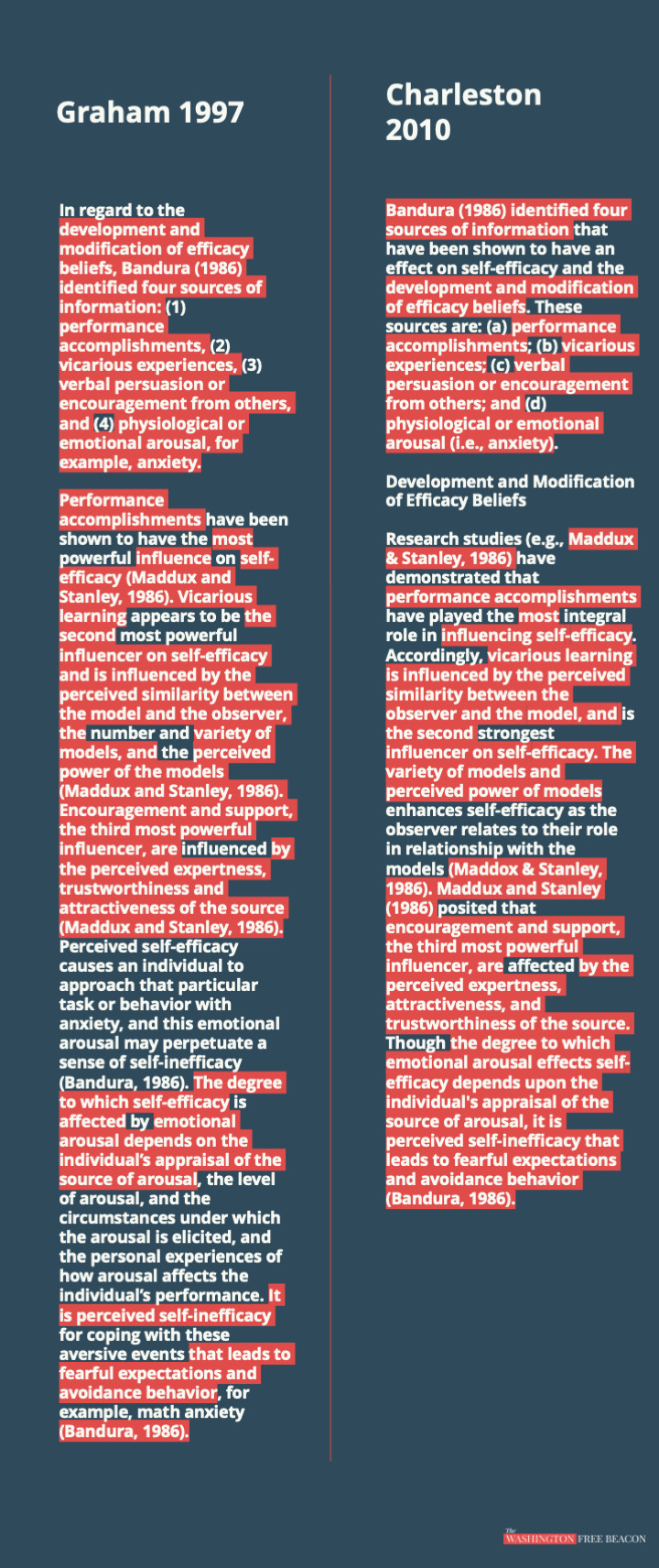
He also borrows from a dissertation by Craig Alan Green, who earned his Ph.D. from the University of Tennessee-Knoxville in 2008, without any sort of attribution.
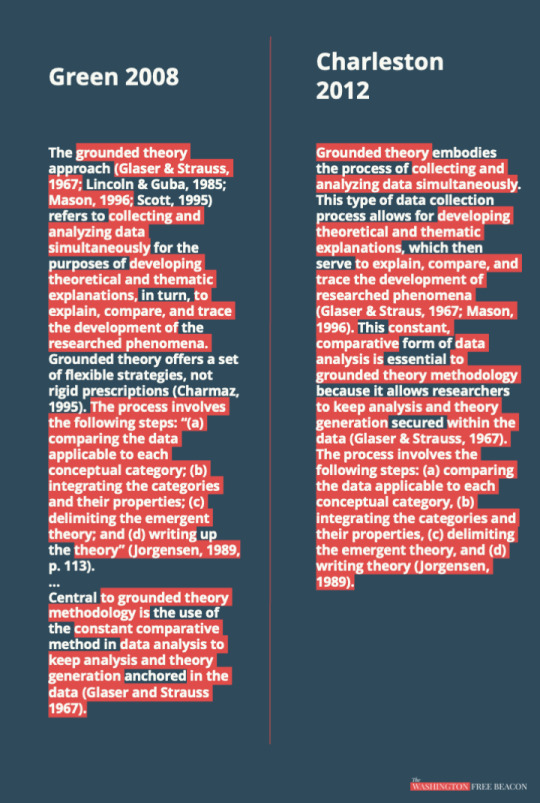
The complaint points out that by recycling a plagiarism-laden thesis, Charleston ensured his subsequent work would contain plagiarism.
"Much of LaVar’s scholarly work since the dissertation lifts language from the dissertation verbatim," the complaint reads. "But the dissertation is full of plagiarism. So LaVar’s peer-reviewed work has plagiarism throughout."
#Aaron Sibarium#LaVar Charleston#plagiarism#academic fraud#academic corruption#DEI#diversity equity and inclusion#diversity#equity#inclusion#DEI bureaucracy#DEI must die#diversity hire#religion is a mental illness
4 notes
·
View notes
Text
Hofstra University
Hofstra Celebrates Mentors Who Nurture Creativity and Research
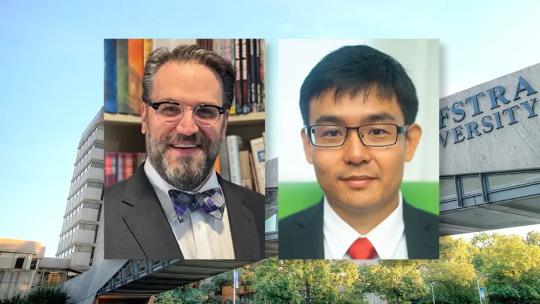
For the first time in its 13-year history, Hofstra’s Mentor of the Year Award will recognize two outstanding faculty members – one who has inspired creativity among students and the other for nurturing research activity. Associate Professor of Drama and Dance Christopher Dippel and Associate Professor of Computer Science Jianchen Shan will be recognized at the Celebration of Scholarly Excellence ceremony at the John Cranford Adams Playhouse on Friday, May 16, 2025.
To read the full story visit https://tinyurl.com/n8xu2myr
0 notes
Text
KLE Degree College Rajajinagar: A Tradition of Academic Distinction

Founded in 1963, KLE Society's S. Nijalingappa College shines as a pillar of scholarly achievement in Rajajinagar, Bengaluru. Linked to Bengaluru City University and sanctioned by the All India Council for Technical Education (AICTE), the college proudly holds an 'A' grade accreditation from the National Assessment and Accreditation Council (NAAC). Throughout the years, it has transformed into a multidisciplinary institution presenting a vast spectrum of undergraduate, postgraduate, and diploma courses across multiple disciplines.
Varied Academic Offerings:
KLE Degree College Rajajinagar provides a wide assortment of programs tailored to meet the diverse interests and professional ambitions of students. The undergraduate courses include:
Bachelor of Science (B.Sc) in combinations such as Physics-Chemistry-Mathematics (PCM), Chemistry-Botany-Zoology (CBZ), and Fashion & Apparel Design.
Bachelor of Commerce (B.Com.) with specializations in conventional commerce and tourism.
Bachelor of Business Administration (BBA) and BBA in Aviation.
Bachelor of Computer Applications (BCA).
Bachelor of Hotel Management (BHM).
Bachelor of Arts (B.A.) in areas like History-Economics-Political Science, and English.
Postgraduate options include:
Master of Science (M.Sc) in Physics, Chemistry, and Mathematics.
Master of Commerce (M.Com.).
Master of Computer Applications (MCA).
Master of Tourism and Travel Management (MTTM).
Furthermore, the college also offers an array of certificates and value-added courses such as Cosmetic Chemistry, Advanced Excel, Power BI, Equity Research, and Fashion Designing, aimed at enhancing the practical skills and employability of students.
Modern Infrastructure:
The college features an expansive campus furnished with contemporary facilities that promote an environment favorable for learning and personal development. Prominent infrastructural highlights include:
Well-ventilated classrooms equipped with audio-visual tools.
Fully-equipped laboratories for scientific and computer applications.
A comprehensive library housing an extensive collection of books, journals, and digital resources.
Wi-Fi-enabled campus for seamless internet connectivity.
Sports amenities support a multitude of indoor and outdoor activities.
The college's dedication to offering exceptional infrastructure guarantees students the necessary resources for academic and extracurricular triumph.
Accomplished Faculty and Academic Excellence:
KLE Degree College takes pride in its roster of highly qualified and experienced educators dedicated to delivering exceptional education. The faculty employs innovative teaching strategies, including interactive lectures, seminars, workshops, and practical training, to ensure thorough comprehension of topics. Their mentorship extends beyond academics, assisting students with research projects, internships, and career planning.
Strong Placement Support:
The college has an active placement cell that connects the academic world with industry. It arranges campus recruitment events, internships, and career counseling sessions to equip students for the professional arena. Renowned companies like Wipro, Amazon, and Deloitte have recruited students from diverse departments, offering attractive salary packages. The placement cell's initiatives have achieved a noteworthy placement record, especially in programs like BHM and BCA.
Dynamic Campus Life:
Beyond academics, KLE Degree College encourages learners to engage in numerous extracurricular activities. The college organizes cultural festivals, technical events, sports competitions, and workshops, providing stages for students to display their talents and cultivate soft skills. Such events nurture a sense of community and enhance the overall educational experience.
Admission Process and Eligibility:
Admission to various programs is based on merit, with eligibility requirements differing by course. For example, candidates wishing to enroll in undergraduate programs like BCA and BHM must have completed their 10+2 education with a minimum aggregate of 50%. Postgraduate admissions, such as for the MCA program, require a valid score in entrance assessments like the Karnataka PGCET. Prospective students can apply through both online and offline channels, with detailed information available on the college's official website.
Scholarships and Financial Assistance:
Recognizing the financial challenges that students may encounter, KLE Degree College provides various scholarships and financial support options. These include merit-based scholarships, need-oriented assistance, and support for students from economically disadvantaged backgrounds. Such initiatives ensure that deserving students have the chance to pursue quality education without financial barriers.
Community Engagement and Social Responsibility:
The college underscores the significance of social responsibility and community involvement. Students are encouraged to take part in outreach initiatives, environmental programs, and social service activities. These experiences cultivate values of compassion, leadership, and civic responsibility, shaping students to contribute positively to society.
Conclusion:
KLE Degree College Rajajinagar, exemplifies the transformative power of quality education. With its rich heritage, varied academic programs, modern infrastructure, and commitment to holistic development, the college continues to shape the futures of countless students. For those in search of a nurturing environment that harmonizes academic rigor with personal growth, KLE Degree College Rajajinagar stands out as an excellent choice.
0 notes